#my jjk meta
Text
in the season two op, we see gojo with an umbrella, rushing over to meet geto. despite the fact that he literally doesn't need one, gojo very clearly brings the umbrella for geto; this is made obvious because this scene is intercut with shots of geto impatiently waiting in the rain and holding a bag over his head.
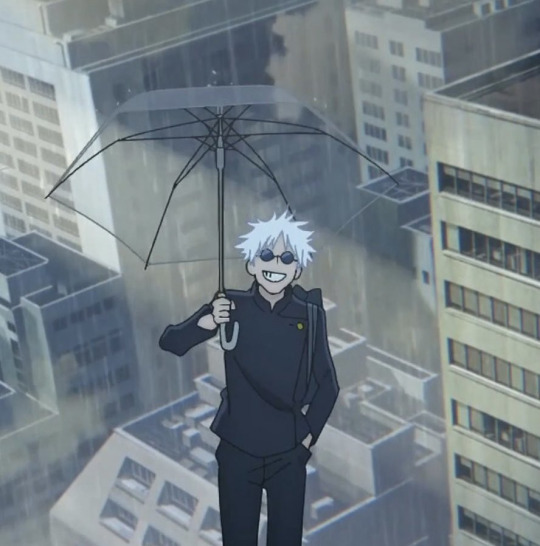
in the season one op, he's once again walking through the rain, but this time he doesn't have an umbrella.

the absence of an umbrella in the rain is stark in comparison to the season 2 op, where the umbrella is the focal point of gojo's stroll through the rain. in season 1, literally everyone else in the opening has an umbrella, making the absence of gojo's even more noticeable.
in both openings, he's walking in the rain. but only in one of them does he have an umbrella, despite the fact that he doesn't need it in either of them.
if you notice something is missing from a room, it's still there, isn't it?
#not to mention gojo is going to geto's FUNERAL in the second one#my jjk meta#jjk meta#jujutsu kaisen#satosugu#satosugu angst#satosugu analysis#jjk#gojo analysis#jujutsu kaisen meta#jujutsu kaisen analysis#gojo x geto#gojo satoru#geto suguru#stsg#gojo#geto#jujutsu kaisen angst#gojo angst#geto angst#geto and gojo#satoru x suguru#satosugu brainrot#stsg angst#stsg brainrot#gojo brainrot#jjk geto#jjk gojo#jujutsu kaisen season 2
2K notes
·
View notes
Text
Is someone gonna talk about the use of signage in yesterday's episode? Do I have to be the one to talk about the use of signage in yesterday's episode?
I know we all saw the billboard beside Choso displaying the abilities of his technique in tandem with the narrator, but there were so many more great uses of the signs in the background to convey information.
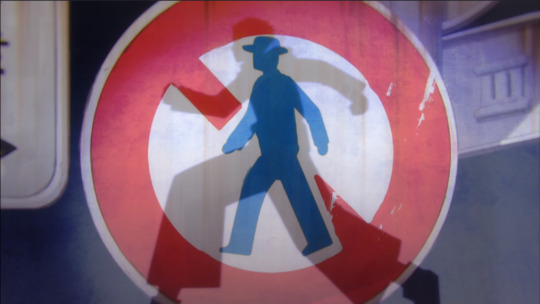
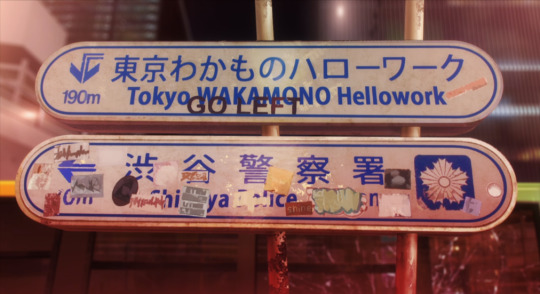
The first sign (and also one of the first shots) that we see in the episode is a Pedestrian Do Not Cross sign overlaid by the sound of Yuuji running, followed by Yuuji's shadow itself taking up the position of the pedestrian on the sign. You can read this as the sign telling Yuuji not to proceed to where he's going or as an indication of how the upcoming fight will end for the viewer.
The next sign that we get is one telling us to Go Left, which doesn't really seem important, but I promise you, it is. We'll see a lot of arrows pointing left throughout the episode and every single one of them is pointing away from danger. Go Left to avoid danger, essentially.
These two signs are arguably the most important in the episode, but they aren't the coolest use of visual symbolism that we got, so lets keep going.

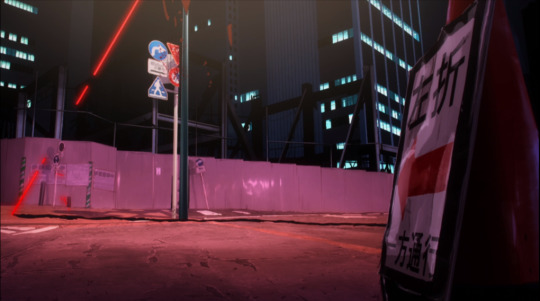
The third sign that we see focused on in the episode is a No Running sign that Yuuji passes that says "Do Not Rush. It Is Dangerous." Yuuji, of course, runs past it on his way toward the escalators that lead (for him) to Gojo and (for the viewer) to Choso.
Once he does get to the bottom of the escalators, Yuuji is attacked by Choso immediately and Choso's opening move (Convergence), once Yuuji moves his arms up and away from his face, slices up through the subway cieling and the road above to cut the Pedestrian Do Not Cross sign that we saw at the beginning of the episode in half.
We also get out first big Left Arrow, placed immediately in the foreground of the shot and pointing toward the aforementioned sign that's been cut in half (this will be important later), but in a another view, it also points away from station itself. Again, go left to avoid danger.
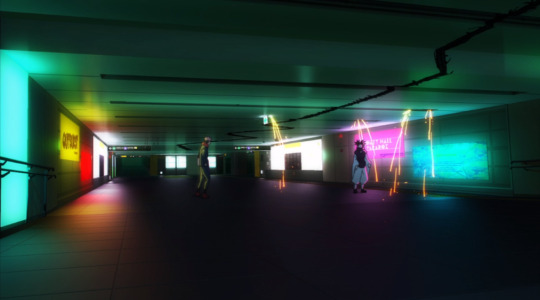

Our next Left Arrow is on the ceiling between Yuuji, indicating that he should go away from Choso. Interestingly enough, it also points toward the bathrooms that Yuuji will go into later once his fight with Choso in the hallway becomes too dangerous.
That same arrow falls to the floor between them once Choso gets mad after Yuuji tells him about Eso and Kechizu crying, this time pointing directly away from Choso.
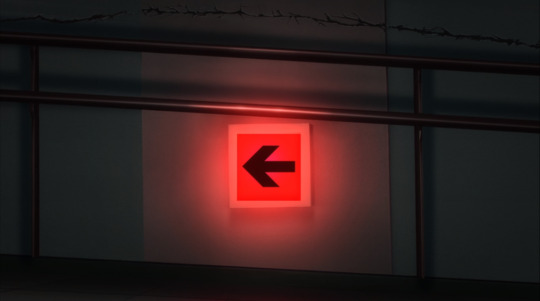
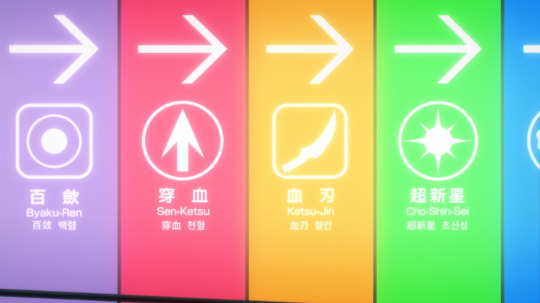
Another Left Arrow, this time in a more urgent red. We see this once Yuuji realizes that he's in serious danger, that he'll loose if he continues to fight Choso in the hallway. It's also pointing away from the bathrooms and toward the escalators from Yuuji's point of view beside the bathrooms, indicating that he needs to leave the area entirely.
The previous arrow pointing toward the bathrooms as a safe option has been destroyed and Yuuji has taken some serious damage by the time he moves toward them. The bathrooms are no longer safe. Yuuji needs to leave.
This is followed up by the only Right Arrows that we see focused on in the epsiode, but unlike the Left Arrows, they aren't used to convey how to get away from danger, but rather what is dangerous. Not only do these arrows all point toward Choso outside of the shot, they also have each of his techniques displayed below them.
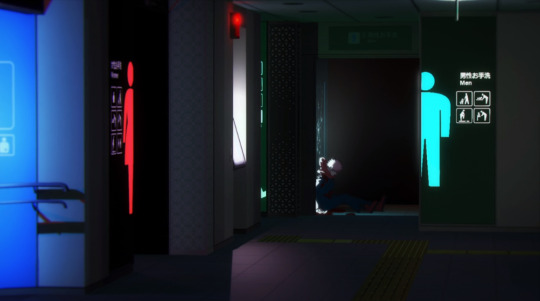
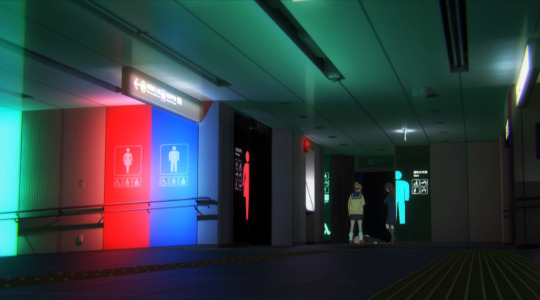
Once the bathroom fight is over and Yuuji is on death's door, we get a zoomed out shot of his body framed by (two) people cut in half. This sign is shown right before Sukuna makes his only appearance in the episode, where we hear the sound of electricity flickering.
We heard this exact sound earlier from the Left Arrow telling Yuuji to get away from Choso at the beginning of the fight, but I like to interpret it as an audio indicator of Yuuji's life and/or control of Sukuna flickering in and out, becoming weaker.
Side Note: In the previous shot of Yuuji that we get before this one, we see a blade of light cutting Yuuji in half, the same way Convergence cut the Pedestrian Do Not Cross sign in half earlier in the episode. This will come into play later in the post, but keep it in mind.
The next time we see these bisected bathroom signs is when Mimiko and Nanako approach Yuuji to awaken Sukuna. Two people framing Yuuji/Sukuna that have been cut, while those same signs are whole in the hallway to the left. Go left to avoid danger applies to the girls here as well.
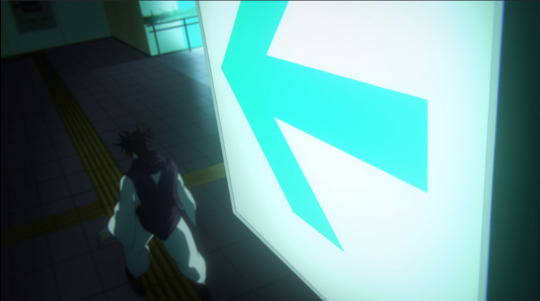
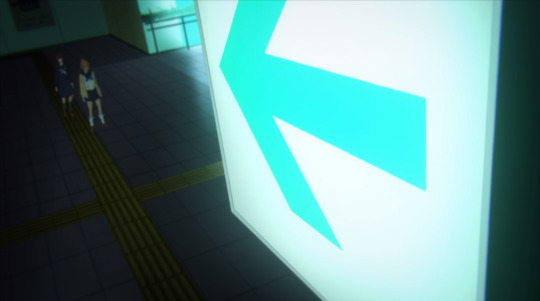
Our next important set of signs are actually the same sign, a large green arrow in the foreground that points away from where Yuuji's body is. While Choso stumbles away from it (away from Yuuji/Sukuna) the girls walk toward it.
This is also the first Left Arrow that we see point toward Choso, unlike the one pointing away from him at the beginning of his and Yuuji's fight. Choso, at this moment and onward, is no longer a source of danger to Yuuji or to us, the viewer.
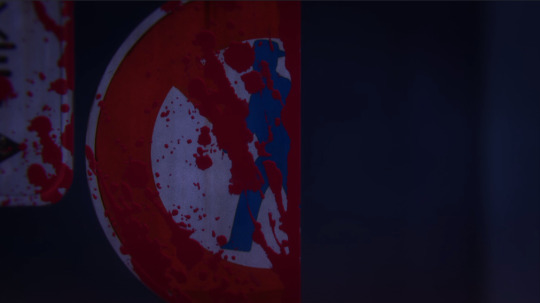
And finally, the final shot of the entire episode, our old friend, the Pedestrian Do Not Cross sign. Yuuji has lost to Choso, the girls have found him to awaken Sukuna, and we get a focus shot of the Pedestrian that previously represented Yuuji cut in half and covered in blood.
I mentioned earlier that we get another shot of Yuuji cut in half by a ray of light in the bathroom.
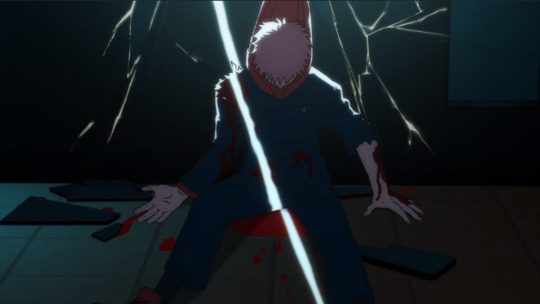
Here is that shot, and the way that I interpret it is as a reminder that Yuuji shares his body. Yuuji's control of his body has been cut off in the same way that the Pedestrian representing Yuuji has had part of it cut away. What's left is the part that Yuuji can't control, the Pedestrian covered in blood.
Additionally, repeated use of a sign showing pedestrians cut in half and bloody can also represent the civilians in Shibuya, especially now that Yuuji no longer has control of his body.
#anywho ty for reading my long post about signs and their meanings in the episode#i was originally going to make this more meme like and shorter#but after going through the epsiode several times i found it more interesting and cool than amusing#signs man. theyre everhwhere#jujutsu kaisen#jjk meta#itadori yuuji#choso#mimiko and nanako#ryomen sukuna#nicos meta
2K notes
·
View notes
Text
I—
This is why language barrier SUCKS. In the manga (and the Japanese dub), the way Satoru replies to Suguru’s concern for him on Okinawa beach is so nuanced, it gets lost in translation.
Chapter 70, Satoru’s english line is “you’re here too.”
The original Japanese version is “オマエもいる”. (Omae mo iru). On the surface, that also means “you’re here too.” But there is so much nuance with the chosen word for “you”, オマエ.
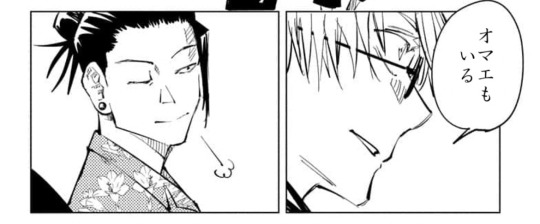
Generally speaking pronouns are avoided altogether in Japanese, but especially the ones addressing someone as “you.” It can be seen as derogatory, rude, or weird, so a lot of people avoid it and use someone’s name or title instead.
Especially for “Omae”, generally it’s used to signify the speaker sees the other person as lower than themselves. When it doesn’t mean that, it can mean:
- addressing a very very close friend (usually between men only) and this implies a certain level of trust and understanding between the two for the point to come across as closeness and not disrespect
- addressing one’s beloved as a sign of protectiveness (this is a more recent and modern application of the word)
Satoru wouldn’t be addressing Suguru in a rude way. We all know how deeply he respects him, no matter what. What I think is very interesting is that Akutami chooses to write it out in Katakana (オマエ) instead of Hiragana (おまえ) or Kanji (お前). Generally speaking Katakana is only reserved for foreign words, which makes it stand out more. It could be stylistic. Or it could be to put emphasis on the word.
I think it’s meant to add depth to the bond between Suguru and Satoru. It’s as if to convey, these two characters share a special closeness that isn’t present between themselves and others outside of the bond.
#i could make a whole separate post on top 10 worst translator moments#sometimes they be changing the WHOLE line#and it annoys me so bad#but anyway yup here’s my machinations for the day#jjk#jjk meta#satosugu#satosugu meta#gojo satoru#satoru gojo#geto suguru#suguru geto#stsg#satosugu analysis
896 notes
·
View notes
Text
If Geto and Gojo were so close, why didn't Geto try to convince Gojo to defect with him?
Because Geto knew that Gojo’s support would guarantee his success, but that success would come at the cost of hurting Gojo.
I believe that Geto cared more about protecting Gojo than he cared about building a better world.
..
Let me explain…
First, let’s talk about why it would’ve made sense for Geto to ask Gojo to join him:
(1) Gojo would’ve been Geto’s most important / most powerful ally
By the time of Geto’s defection, Gojo is already the strongest sorcerer in existence. He and Geto are two of only three special grade sorcerers. Having them both on the same side is essentially an automatic win.
(2) Gojo should’ve been (relatively) easy to persuade
Gojo had already told Geto that he didn't like having to save the weak and didn't care about the moral justifications for it…
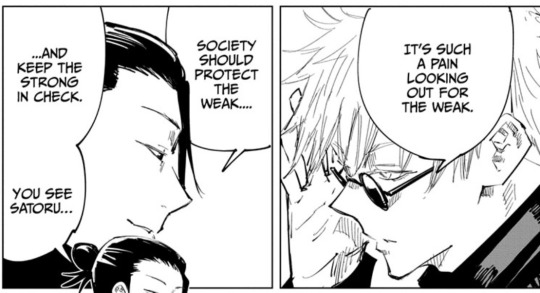
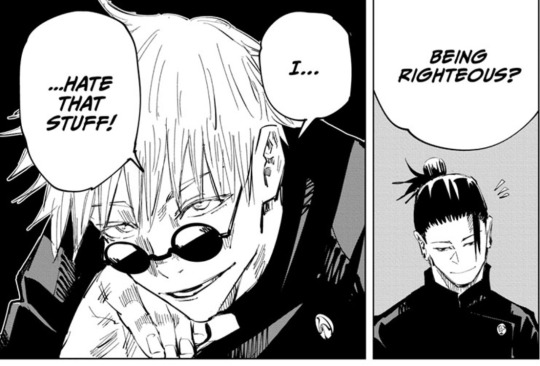
…Geto has also seen that Gojo doesn’t always value / protect human life. He was ready to massacre the Time Vessel Association without reason, but ultimately he didn't, because he deferred to Geto's judgement…
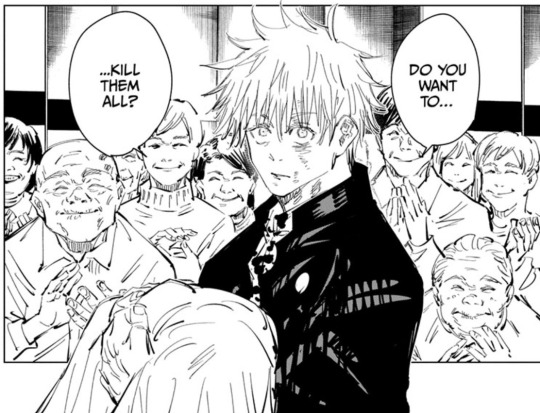
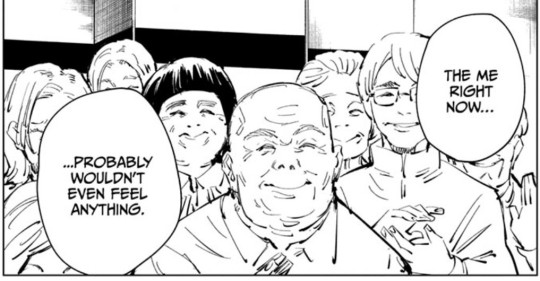
…and, most importantly, they are best friends on a DEEP, unparalleled level. Geto is Gojo’s “one and only” best friend.
If Geto was truly dedicated to changing the world order, Gojo should’ve been the first and most important person that he tried to recruit to his insurgency / cult / mission.
BUT
Not only does Geto make zero effort to reach out to / recruit Gojo, he actively avoids him and pushes him away...
- - - - - Keep reading cut - - - - -
After he kills the 112 non-sorcerers, Geto runs into Shoko in Shinjuku. He happily approaches her and willingly answers her questions.
Look at his smiling face in their interactions:
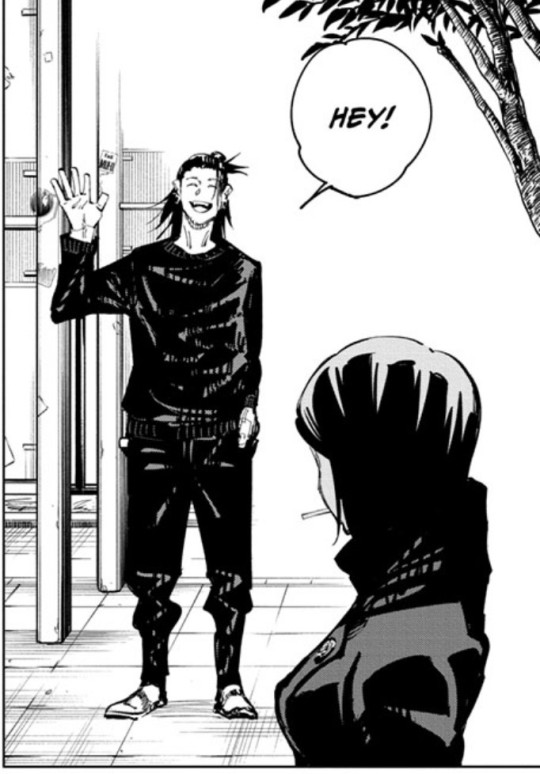

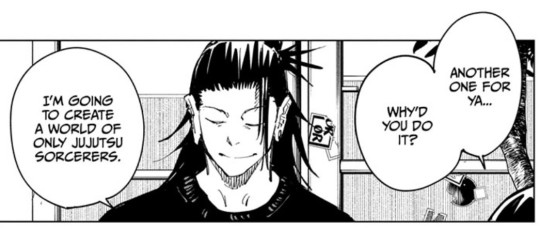
But, when Shoko calls Gojo, Geto leaves before Gojo shows up. Gojo tracks him down anyway and demands an explanation. Geto still doesn’t want to talk about it (“You already heard it.”)
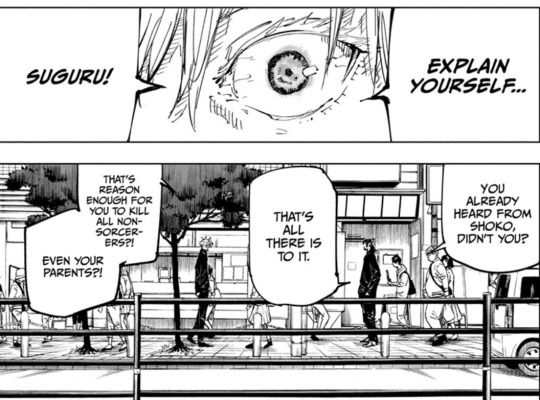
It's strange, right? Geto loves talking about his vision of a better world with everyone else.
Then, there is this confusing progression of dialog:
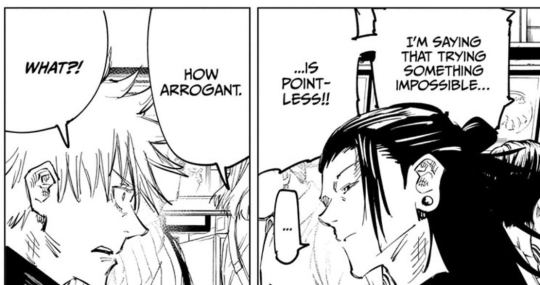
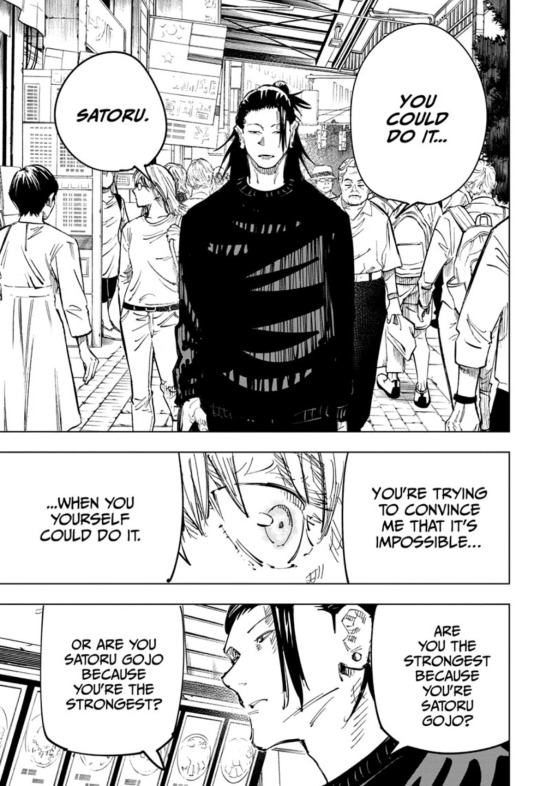
Geto is hurt/annoyed that Gojo doesn’t believe in him, so he points out that Gojo’s argument against his plan is invalid. The plan is possible (“You could do it”), therefore (according to Gojo’s own logic) it’s not “pointless.”
In a way, Geto is admitting that he knows it would make the most sense for Gojo to join him.
But before Gojo can respond, Geto pivots to saying something extremely hurtful. He's questioning who Gojo is / would be if he wasn't the strongest. Is there really anything more to him? (See more detail in my post here).
Then, in the very next panel Geto turns and starts walking away.
In summary: (1) Geto avoids Gojo, (2) Geto only argues in favor of his plan when Gojo forces/baits him, (3) Upon invalidating Gojo’s opposition to his plan, Geto immediately puts emotional distance between them, (4) Geto then puts physical distance between them.
Why is Geto trying so hard to make sure that Gojo won’t follow him?
Is he just being prideful about doing this on his own? Is he so angry at Gojo's arrogance that he'd jeopardize the success of his life's mission over it?
These arguments aren't in line with Geto's characterization / known motivations (see the end of this post, if you're interested in more on that.)
Geto's main motivation is (a twisted form of) compassion. He wants to end the suffering of sorcerers.
He is a thoughtful, contemplative person, and would've thought about the ramifications of recruiting Gojo.
What are the ramifications?
If Gojo joins the cause, Geto’s plan would succeed, but Gojo would suffer for it.
Like anyone who joins Geto's cult, Gojo would become a pariah / fugitive from Jujutsu society. He’d kill people. He’d kill other sorcerers.
But because Gojo has the singular level of strength/ability to kill non-sorcerers en masse, he would commit the vast majority (or all) of the murder / destruction. The legal, social, and mental impacts would be most severe on Gojo.
(Also, at this point, I think Geto may still question whether he’s made the right choice. It’s difficult to go from a hardline stance on protecting non-sorcerers to wanting to gen0c1de them, within the span of a year, without any lingering ethical qualms. So he may be worried about moral costs to Gojo as well.)
Let’s remember that Geto (canonically) deeply loves Gojo. Gojo is his one and only best friend. Geto worries about Gojo when he overworks himself protecting Riko. Geto is shocked when Toji kills Riko in front of him, but he only flies into a rage when he thinks Toji has killed Gojo. (Again, see my post here for more on how much Geto loves Gojo).
So, it makes sense that Geto is ready to make sacrifices to create a better world, but it’s a cost he’s willing to put on his own head. Not Gojo's.
Ultimately, Geto cares more about Gojo than he cares about achieving the mission he has dedicated his life to.
The last thing Geto says to him is this:

What he's really asking Gojo is: "Have you stopped loving me, now that I've committed myself to this dark path? Would you kill me to save them?"
If Gojo hates Geto enough that he’d kill him, then Geto never had a chance of recruiting Gojo in the first place.
Of course, Gojo can’t make himself hurt Geto. He still loves Geto too much.
Geto protected Gojo by pushing him away.
___
Addendum:
I'll also argue against two other possible explanations for Geto's behavior.
(1) Geto is jealous / prideful /wants to build his own legacy without Gojo stealing the spotlight
Geto has clear motivations for his goals and they’re not egotistical. He wants to end the suffering of sorcerers caused by non-sorcerers’ existence (e.g., Riko’s death, Mimiko & Nanako’s abuse).
Geto’s pride isn’t hurt when Gojo becomes the strongest. The only thing that bothers Geto is that they’re getting sent on separate missions.
After Gojo becomes stronger that him, Geto still has overt affection for Gojo (e.g., he asks Haibara to bring back sweets from his mission so he can share with Gojo).
Although Geto does believe in his superiority over non-sorcerers, he doesn't feel superior over other sorcerers and doesn't struggle with his 'inferiority' to Gojo.
Does Gojo’s lack of faith in Geto’s ability (calling his goal “impossible”), spur Geto to want to prove himself? Yes, probably. But Geto had already been avoiding Gojo before he said that. And I don’t believe that wanting to prove himself to Gojo would overshadow his stronger motivation to build a better world for sorcerers.
(2) He thinks Gojo actually is too moral to join him
After Geto kills the 112 non-sorcerers, Gojo is shocked and upset by what’s happened, but not once does he insult Geto or imply that Geto has done something unforgivable. In fact, he’s practically begging Geto to explain himself because he wants to be able to justify his actions. And, again, Gojo’s argument against Geto’s plan is NOT that “it’s wrong,” it’s that “it’s impossible.”
#This is what I live my life by 100%#I will not be convinced of any other truth#satosugu#jjk#jjk analysis#jujutsu kaisen#gojo x geto#gojo satoru#geto suguru#stsg#gego#goge#satosugu analysis#jjk manga#jjk canon#satosugu canon#jjk meta#satosugu meta#sugusato#my jjk thoughts
775 notes
·
View notes
Text
Who knew the biggest SukuIta shippers in this fandom are the jjk fans in reddit.

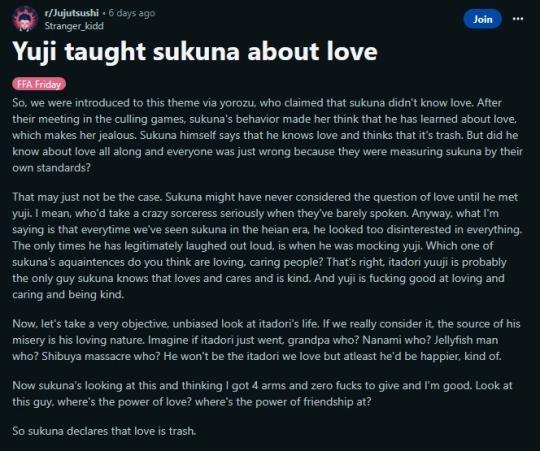

The comments are killing me 😂
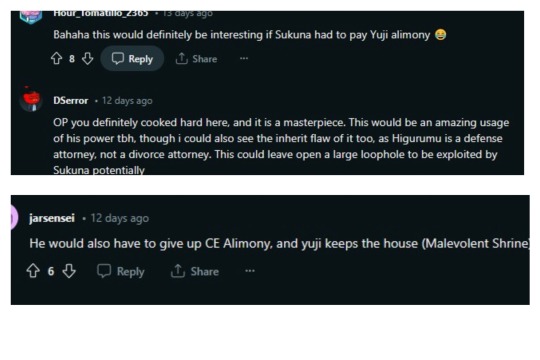
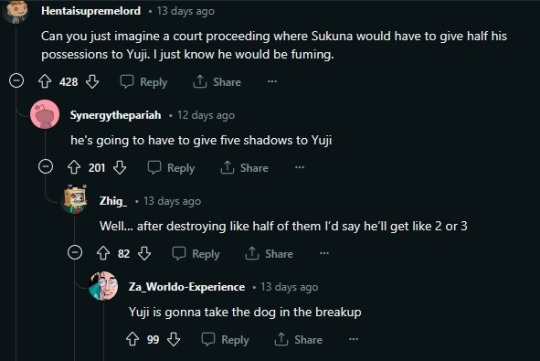
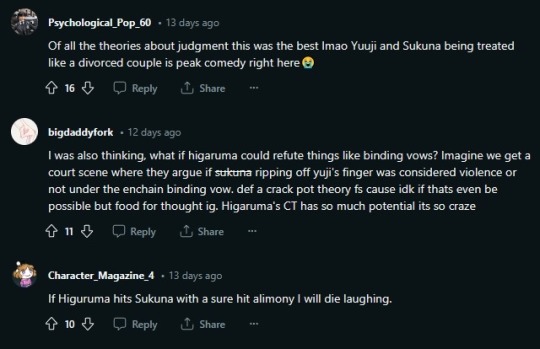
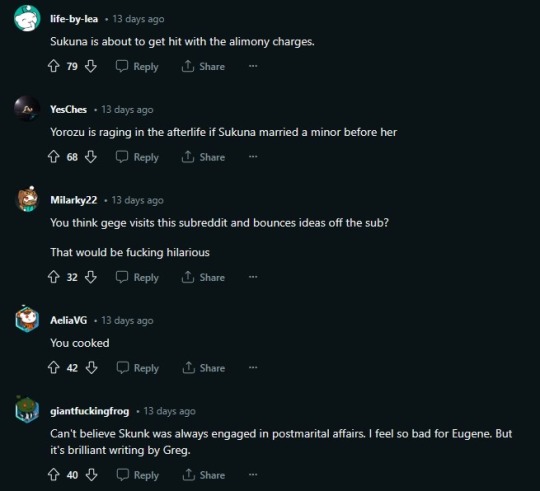

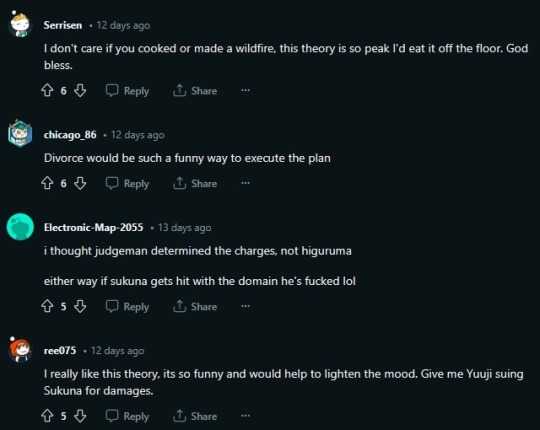
#give itadori yuuji his alimony rights#sukuita#sukuna#ryomen sukuna#itadori yuji#higuruma hiromi#the laments that he isn’t a divorced lawyer#jujutsu kaisen#jjk#fandom#meta#humor#reddit#note i have found my people 😂😂🙏🏼
575 notes
·
View notes
Text
I still can't get over stsg's introduction as a concept. gojo was built up to be isolatingly powerful, a league of his own: childish, annoying to all those close to him, hard to stand but respectable (aka nanami and utahime), a slippery guiding mentor, unruly and untamable, a whole force of his own and solely his own (the confidence, the disobedience to elders, the reputation, the fear and awe around him)---all introduced through yuuji's non-judgemental and curious lens. I think someone pointed ages ago out how- the closer someone is to gojo, the more tired they look inside. and that's why when they actually introduce the fact gojo had an actual, real friend- a best friend- you start to think, what? what kind of person would suit and match satoru gojo? who is this? who would make gojo feel equal? and it's somehow??? this obnoxiously moral guy?? filled with a kick of anger and buckets of tormented righteousness, and a witty (later turned bitter) benevolent streak. and you watch gojo watching him, always standing by him, watch him fit into place there like he couldn't see anything else. watch the in-sync laughter, the back-and-forth banter, watch them just be teenagers admist it - someway and somehow - same childish attitude, but younger, impressionable, and its like gojo's storing all his experiences with geto away in his mind. the discussions of who to protect-? gojo lives it out. the pain of geto's fall-? gojo carries it for the rest of his life, an aching open wound. it almost hurts that gojo's childish antics aren't complimented by geto's indulgent, light-hearted admonishing anymore. something you didn't realise was missing the whole time until now??? didn't realise "after all, I'm the strongest" used to be been "after all, we're the strongest". and in getting to know geto, you puzzle through how he was gojo's 'one and only': a guy who's personality comes off a bit controlling, a bit forceful, way too philosophical, clinically considerate- and somehow this really was gojo's best friend. they clashed over all their differences all their time together and yet even that was so important to them both, and you come to know it couldn't have been anyone else. this is who helped make gojo who he is. this is who was missing from him at the start.
#rambling again sorry#physically needed to get this off my chest#its been in my head ever since i read the hidden inventory arc#jujutsu kaisen#satoru gojo#suguru geto#stsg#satosugu#jjk meta#txt#jjk#my thoughts
1K notes
·
View notes
Text
Thoughts on Gojo Satoru
Gojo Satoru is a character with nuance.
With the release of JJK chapter 236, many people are shocked, confused and outraged at his characterisation at the end of his run in the manga. There are claims of character assassination, of blatant disregard for everything he has done so far, of telling instead of showing. The portrayal of Gojo as someone whose primary motivation was strength has left multitudes of fans reeling.
Nanami states that Gojo’s reason for wielding jujutsu was not his own survival, nor the protection of others, but rather in pursuit of wanton satisfaction. Gojo does not deny this and neither can we. After all, in chapter 233 it was stated by the narrator that as the possibility of defeat crossed Gojo’s mind, an intense feeling of satisfaction bubbled up in him as well. The truth is, Gojo loves jujutsu. He loves his own strength. He loves to use it, to show it off, to flex. He revels in his own power.
Gojo enjoys being The Strongest.
However, he doesn’t enjoy being The Strongest, alone.
The contradiction in Gojo is that, much like Sukuna, he sees himself as More Than. They are beyond humans, beyond curses, beyond anything of this world. They exist in a realm of their own. Make no mistake, Gojo harbours great affection for those around him. He says as much in 236 (みんな大好きさ寂しくはなかった - I really liked everyone and I wasn’t lonely). But he also admits that there was a separation between himself and other other living creatures. This phrasing is crucial. Gojo is effectively admitting here that from his perspective, other humans are as different from him as any other creature of this world. He doesn’t even really consider them to be the same species. This is further reinforced through his analogy of flowers. He states that you can admire a flower and make it bloom, but you don’t wish to be understood by it. Gojo cares for those around him and he cultivated his students to help them blossom, to achieve their potential, but they were flowers to him. They were inferior beings, incapable of understanding his superior existence, and so why should he open himself up to them? Shoko mentally chastises him for this in chapter 220, pointing out that she was right there alongside him even with the loss of Geto, that all his talk of being alone was idiotic because she was there and he could’ve relied on her. But he didn’t because in his mind, Shoko, like everyone else, is inferior and incapable of understanding him. To him, it is pointless to try.
But where Gojo differs significantly from Sukuna, is that Gojo desperately wants to be understood.
Gojo is so painfully human in that way. Perhaps he wouldn’t be, had he never known Geto. But he did know him, and for those 3 years, Gojo knew companionship. He felt understood by Geto because Geto, being equally The Strongest, was capable of understanding Gojo, in Gojo’s own mind. When Geto defected, he called Gojo arrogant in his own strength for saying killing all non-sorcerers would be impossible for Geto and attempting the impossible was pointless, when such a task would not be impossible for Gojo himself. He asks of Gojo, “are you the strongest because you’re Gojo Satoru, or are you Gojo Satoru because you’re the strongest?”. This exchange, unfortunately causes Gojo to misunderstand Geto’s reason for defecting, or at least to oversimplify it. Gojo’s takeaway is that the issue was in Geto’s inability to keep pace with him. This would further solidify his belief that he exists apart from all of humanity. Yet he could not make peace with that. He mourned Geto’s departure and disliked his newfound loneliness (which, mind you, was only the case because of that very belief that only an equal in strength can understand him).
This would drive Gojo to seek out Megumi, something he could have done at any point in the year since Toji’s death but had no motivation to do. The words he says to Megumi are crucial - “強くなってよ。僕に置いていかれないくらい” or “Get strong. Enough to not be left behind by me.” From this, two things are clear. First, that Gojo has no intention of slowing down. Second, that Gojo wants Megumi to be on his level. He’s essentially seeking out another Geto, one that he won’t lose to their own inability to keep up with him. He’s not willing to come down from his superhuman level to connect with the average - as previously said, Gojo revels in his own strength - but rather he wants others to ascend to his level. Gege stated in the fanbook that the reason Gojo went to find Megumi was because he’s seeking talented people, and the reason he helps problem children like Yuta and Yuji is because they’re strong so he doesn’t care about the other details. There is no mention of righteousness or kindness in his actions here. Now, the fanbook is secondary material so I will always err on the side of the main text taking precedence. But since the main text does not give us any explanation from Gojo as to his true reason for saving Yuta and Yuji, and Gege’s explanation in the fanbook on Gojo’s recruit of Megumi aligns with what we see in the manga, it’s likely that his interest in Yuta and Yuji is indeed purely due to their strength potential, at least at first. He does grow fond of them as people, and he wants them to enjoy their youth. But ultimately, his reason for raising them remains that, selfishly, he doesn’t want to be alone at the top.
His idea of “resetting the crappy jujutsu world” is making it so that life as a jujutsu sorcerer is as fun for everyone as it is for him, or at least as he imagines it would be if his youth hadn’t been interrupted by Geto’s spiral. Being a jujutsu sorcerer is Gojo’s job, but he doesn’t resent it at all. Because unlike all the other sorcerers who are here because they have no choice, or because they feel a sense of responsibility to protect the defenceless, or because they fear being killed by curses and using jujutsu as a retired sorcerer is illegal (looking at you, Kusakabe), Gojo is here because jujutsu is fun. He doesn’t feel that inherent drive to protect the defenceless (he actually finds that part of it kind of exhausting) and he doesn’t feel that fear because no curse could remotely threaten him, so he just gets to enjoy jujutsu for what it is. Gojo wants the same for his students. He wants them to enjoy the experience of life as a jujutsu sorcerer, without fear, and without suffering and being forced to question what the hell they’re even doing this for. If they can be as strong as him, there is nothing to worry about - nobody dies, nobody gets left alone, nobody falls behind. It’s an idyllic picture for Gojo.
There seems to be a misconception that 326 suggests that Gojo’s only reason for training the students was to eventually fight them at their best. That is not the case. Gojo’s love of fighting and Gojo’s desire for an equal are two separate things that only got amalgamated in Sukuna. After all, Gojo never sought to fight Geto. We know they scuffled sometimes, but it’s not like Gojo was constantly trying to instigate a death match. His desire for an equal is, on its own, simply a desire to be understood, something he does not believe is possible by a weaker being. He longs for companionship but won’t let himself find it in people he views as inferior. Regardless of having an equal, Gojo still loves his own strength. He loves toying with opponents, and showing off, and brutal violence. The more challenging the opponent/situation, the further he gets to stretch his limbs.
Fighting Sukuna presented Gojo with an opportunity to satisfy both of these things.
Does Gojo have anything against Sukuna or the way he lives his life? Not really. There isn’t an ideological opposition at play here like there is between Yuji and Sukuna, they just happen to be allied with parties who are in conflict. And, with them both being the jujutsu-loving, strength merchants that they are, they’re genuinely excited at the prospect of fighting each other. Gojo does want and plan to save Megumi, sure, but in any case that requires defeating Sukuna. He wasn’t bluffing when he said he’d worry about that later - fighting Sukuna genuinely takes priority, both strategically and selfishly.
In terms of the fight, Gojo has a blast. He gets to go all out like he’s never gone all out before. He’s pushed to invent things on the spot or legitimately just die. He doesn’t even have to toy with his opponent to keep the fight going, he’s sprinting from start to finish and is giddy with it. This is possibly the most fun he’s ever had.
In terms of the emotion, Gojo has been desperately trying to find someone as strong as him because (he believes) only they can understand him. It’s to the point that he has spent the past decade trying to basically build-a-bear some equals. Suddenly, he’s presented with one, fully formed, requiring no additional shaping on his part. It’s believable that he would be excited to take that chance of being understood, being seen wholly, by the only person alive in the world at this moment that he believes capable of wrapping their mind around him, since they’re both so far above every other living being.
And so Gojo fights Sukuna and pours everything he is into it. He pushes his body to its physical limits, he uses every jujutsu ability he’s ever learned, he comes up with new ideas on the spot, he throws out multiple max output attacks. Everything we have ever been told that Gojo is capable of doing gets put on show in this fight. He does all this because he wants Sukuna to see him in his entirety, because nobody else ever has. If he tried to unleash all of this on anybody else, it would kill them before he could even get a quarter of the way through.
See, on the one hand, Gojo’s self imposed isolation is born of his own arrogance but on the other hand, he’s also right in a way; because jujutsu is a part of the makeup of Gojo Satoru - its something he enjoys and it will always be a part of him. Yet he does not fight with allies because in doing so, he would be forced to limit himself. Like Yuta acknowledges in 235, if they were on the battlefield Gojo would have been unable to perform that AoE purple blast without harming them too. He must choose between being alone when doing jujutsu, or restricting himself in this thing that he loves. This feeds into the notion that they can’t understand him - he literally has to contain himself so as not to be too much for them.
He’s not too much for Sukuna, though.
Against Sukuna, Gojo gets to exist in his entirety, unrestrained, and for that he is appreciative. But we also see Gojo’s kindness, or rather empathy. He personally was satisfied by the fight - he was able to be seen wholly. He could simply have a “fuck you, got mine” mentality about it, but we see that he actually feels sorry to Sukuna for not being able to take everything Sukuna is the way Sukuna was for him. Sukuna could not afford to go all out if it meant dying to the other sorcerers as soon as the fight with Gojo ended. I believe this is why he looked less impressive throughout the whole fight - a Gojo giving it his all puts on more of a display than a Sukuna sticking to a pre-determined plan and doing minimal improvisation. But even though Sukuna didn’t let himself go all out, he still won. This would lead Gojo to believe (and it’s not an illogical conclusion) that if Sukuna had been going all out, Gojo wouldn’t be able to take it all. Gojo feels bad about it because he was unable to be for Sukuna what Sukuna was for him, he feels bad that Sukuna will seemingly never experience that same satisfaction (because, of course, if it’s not Gojo himself giving him that, he thinks nobody else can). This isn’t Gojo feeling bad about himself for being weaker, it is genuine empathy for Sukuna because Sukuna is someone that Gojo does actually perceive as the same species as him, not someone he necessarily considers evil or an enemy.
It’s not as bad as he thinks, though, because Sukuna did take immense enjoyment in this fight. It’s true that he wasn’t pushed to the point of having to give everything here, but he was still pushed further than ever before. Many people have confused “he wasn’t going all out” for “he wasn’t even trying” and that’s such a dichotomous way of looking at things - zero or one hundred. Sukuna was absolutely trying in this fight. For the first time in a thousand years, he actually felt the nervousness of possibly losing, because Gojo’s final purple could have killed him. It’s only because it was an AoE attack and not directly aimed at Sukuna that he survived, and visibly in the worst condition of his life. And after slicing Gojo, he praises him (“you were magnificent” is crazy levels of acknowledgment from Sukuna!) and admits that he will never forget him for as long as he lives. This is coming from the guy that called Gojo ordinary and unenlightened just 6 chapters prior. Gojo moved him, this much is undeniable. And Gojo’s smile in his final moment suggests that he heard Sukuna. In the end, he knows that he did reach him in some way.
(Brief side note: Gojo never says he would definitely have lost to Sukuna even without the ten shadows. What he actually says is simply that he’s unsure as to if he would’ve won. And that’s because he, unlike much of the fandom, recognises that Sukuna’s skill and genius understanding of CE and jujutsu mean that without the ten shadows, he would’ve approached the fight very differently, especially those domain clashes, during which it’s clearly stated that Sukuna refrained from using his CT or even domain amplification too much so that the ten shadows could continue adapting in the background. Take out that element and of course Sukuna has more resources freed up to put into fighting Gojo actively.)
So this is the nuance of Gojo’s character. He’s selfish, yet capable of true empathy. He cares deeply, despite his unfathomable arrogance. His motivations are questionable, without being malicious. He sees himself as beyond human, yet at his core is painfully so. He’s not a hero, nor even really a “good” person. But he influenced those around him in ways they will carry forever.
#gojo is a bitch and i like him so much#he’s so [squeezes him with my fist until the juices run out]#he is not normal! there is something deeply wrong with him!#(affectionate)#but he cares#not in the way ppl thought but he does#take him as he is or don’t#gojo satoru#sukuna#jjk 236#jjk analysis#jjk meta#jjk#duo: the one who will teach you about love#satoru
560 notes
·
View notes
Text
Was anyone going to point out to me that the reason why curses were swarming the streets and filling every empty nook and cranny in the summer of Geto's spiral was actually Gojo Satoru?

The narrative already bears witness to how Satoru's mere birth tips the balance of the world. As the first Gojo to be born with both the Limitless and the Six Eyes in what is almost a half-millenium, he holds unparalled power. Him simply existing is enough for curses to spring into action and start growing in strength as well.
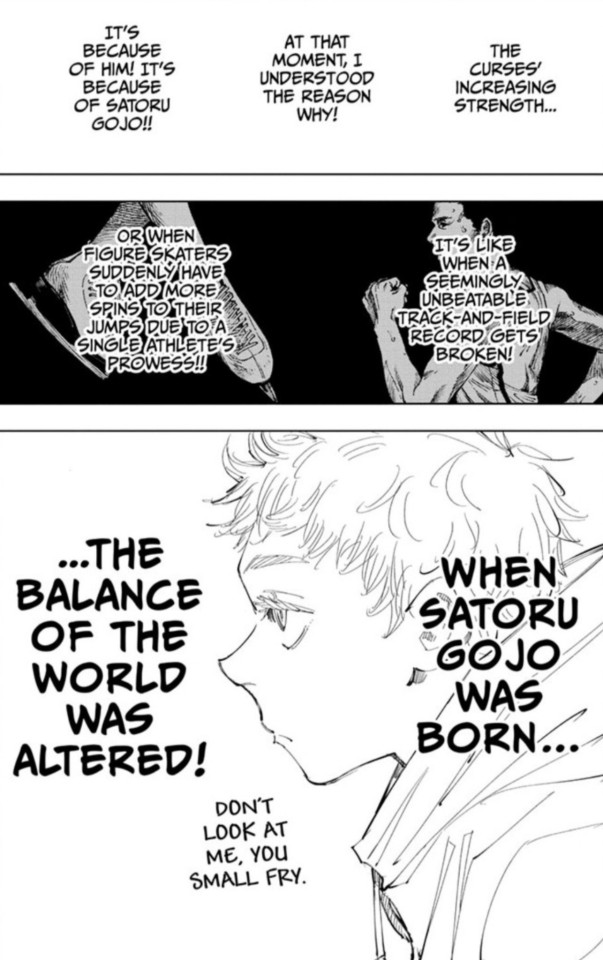
When he suffers a crushing defeat by the hands of Toji and subsequently thrusts himself vigorously into perfecting his technique, this rapid increase in his strength puts into motion a similar process. He becomes stronger, and so cursed spirits follow suit. He breaks the fragile equilibrium, and cursed energy seeks means to restore it.
First time Satoru Gojo changes the world, he is named the strongest. Second time Satoru Gojo changes the world, he becomes the strongest.
Now, this might be a bit of a stretch on my part, but what if Geto's defection and everything in its aftermath is how the world responds to Gojo being the strongest? After all, you cannot balance the scales by putting too much weight on just one side.
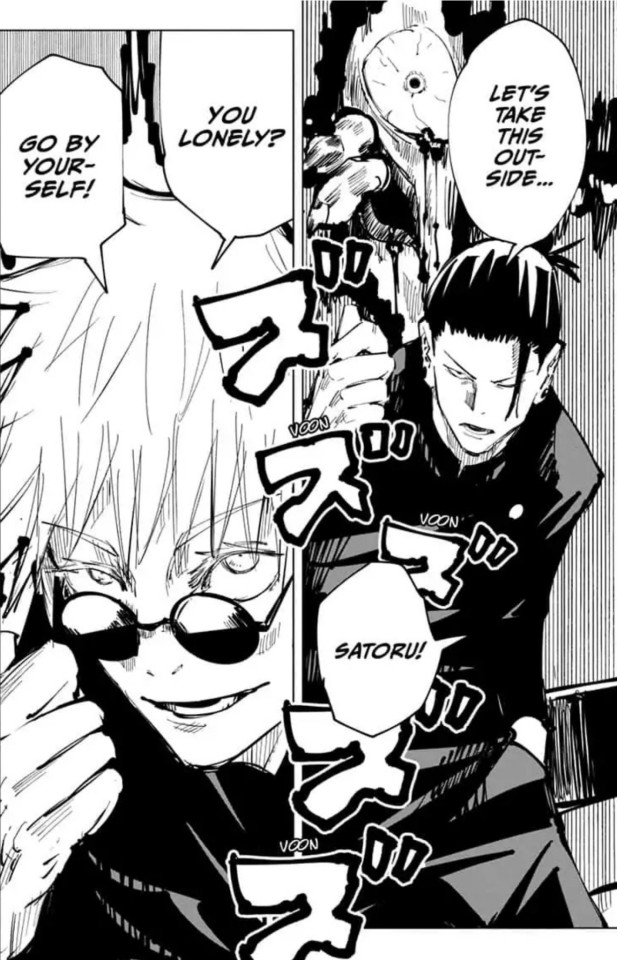
Suguru's abilities as a sorcerer are inherently deeply tied to Satoru's, and intentionally so. The stronger he is, the more potent the curses are -- and therefore the more potential there is for Geto's technique. I have said it before and I'll say it again: they are a perfect counterbalance to each other. The equilibrium is broken by Gojo twice. Each time, Geto is there to restore it: first by being born with the ability to manipulate curses, then by creating the opposition to jujutsu society, which Gojo has become the centrepiece of.
Ever since Suguru Geto entered the narrative, he has been the one to keep Gojo's powers in check -- hence preserving the balance. That's why the narrative brings him back: in order to be well-balanced, it needs both of them to be present.
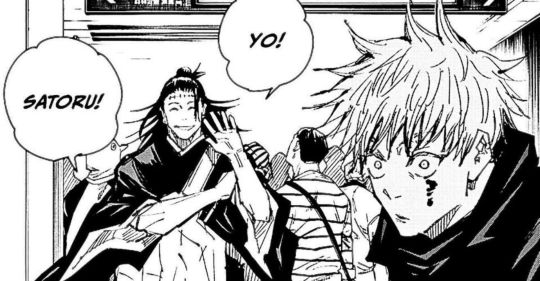
#jujutsu kaisen#jjk analysis#gojo satoru#geto suguru#satosugu#they are really designed to be a pair huh#i'm once again asking it#gege why#sorry if it's messy#i feel like i haven't elaborated on my thoughts enough#but i don't know how to organize them any better#and i guess it's important to note that i'm not talking about their direct motivations#but rather indirect consequences of their actions on some meta level of the story#and i'm not putting blame for what happened on gojo#not at all#geto had his own reasons and motivations#he made a choice and took his own path#i think his spiral down is so well-written because it takes root in the internal struggle#it could be accelerated by some outside forces#such as unbearable workload that drained him#but the reason he spiraled was the inability to make peace with himself#to somehow justify the gap between his own ideal and that cruel reality which he witnessed#all he did was stayed true to himself to a fault#it's nothing that could be helped by gojo#let alone caused#nonetheless they are tied by the narrative#and that's what i'm talking about
373 notes
·
View notes
Text
The way love is such a prevalent theme throughout jjk has me in shambles
especially because it's not even a "love saves the day" kind of thing no love literally doomed some of these people. It's why Riko didn't merge with tengen, it's why Gojo couldn't kill Geto the first time, it's why Kenjaku was able to take over Geto's body, it's why Yuuta cursed Rika, it's why Gojo got sealed, it's why Maki massacred the Zen'in, it's why Toji spiraled like almost every pivotal point in the story can be linked to someone whose love for another resulted in catastrophe
Gojo was right that love is the most twisted curse of all
#and the most damning part is that the majority of those times are because of satosugu#kenjaku would have never gotten geto's body if gojo had parted with it properly#gojo would have never been sealed if he wasn't so in love with geto and shocked when he saw him#posts#jjk#jujutsu kaisen#satosugu#yuuta#maki#toji#kenjaku#geto#gojo#jjk analysis#jjk meta#these are all literally off the top of my head and im tipsy if i really thought about it i know i could think of more
293 notes
·
View notes
Text
on nanami
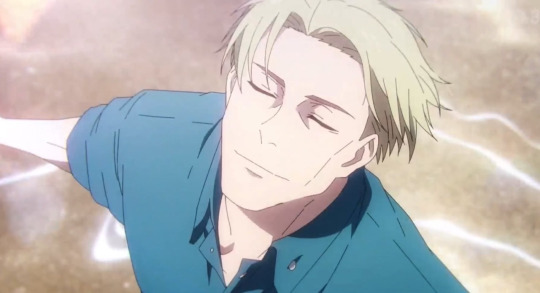
sometimes i forget that a healthy part of the fandom hasn't read the manga, and that nanami's death actually came as a shock to some this week.
which is warranted, given that nanami is one of JJK's better written characters – a rare breath of fresh air, maturity, and warmth in a story that often speed-runs character development.
but i've also seen people bringing up this tweet, expressing a bitterness at gege for killing nanami when he initially intended to let him off with losing an arm:
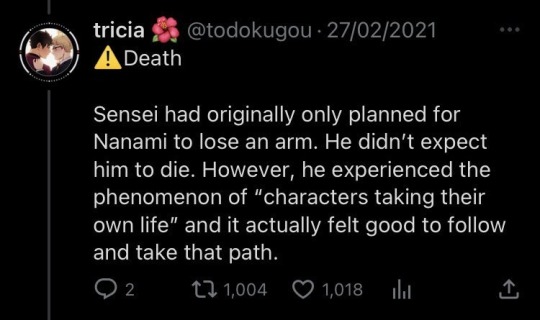
now, don't get me wrong – gege has had his fair share of bad writing moments (more to come in future seasons when we finally get to the culling games and, uhm... you'll see).
what he meant by a "character taking their own life" referred to the natural end of a character's narrative.
nanami was introduced in JJK as an opposite to gojo – he's aloof, he's too serious, and he just wants to knock off work on time. but as we come to know, nanami also has a softer side to him – one that instinctively protects and cares for the young jujutsu sorcerers, as a result of his traumatic past after the death of his best friend.
and in the story, nanami served as yuji's mentor. he defined, for yuji, what it meant to be a sorcerer, and more importantly – a young jujutsushi.
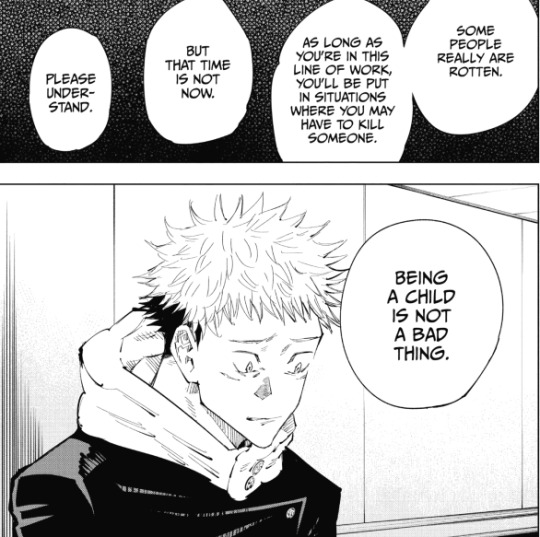
in many ways, he wrote and defined the moral compass that yuji would lean on subsequently in the story.

i wouldn't go as far as to make this post a "why nanami had to die" – but i would also like to make it clear that nanami's role in the story besides being a board-certified dilf™️ is to root both the readers and yuji in the realities of being a jujutsu sorcerer.
and for mahito – his thematic opposite, someone with a complete disregard and disrespect for humanity – to kill nanami, while allowing nanami to pass on his final words to yuji...
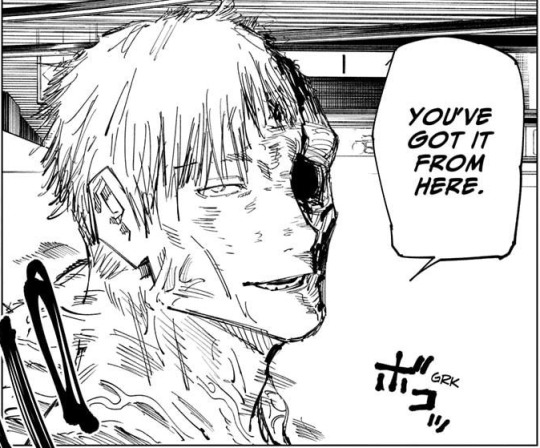
he is not only resolving the conflict he has within himself – because he is able to die with the knowledge that yuji will not be "cursed", that yuji will continue as a jujutsu sorcerer with the right moralities, capable of facing the demons nanami once tried to run away from as a teen.
so, no, gege did not get carried away with killing nanami, as some have opined. nanami's narrative – as a character saddled by the burdens of being a sorcerer, who escaped from his responsibilities as a teen only to return, and to pass them on to a young boy who also has too much to shoulder – simply came to a close. x
#nanami kento#jujutsu kaisen#jjk season 2#nanami kento x reader#nanami kento x you#nanami kento x y/n#jjk meta#jjk analysis#idk these are just my two cents#fandom has a difficult time distinguishing 'idl this because it happens to my fave character' and 'idl this because it's bad writing'#not that only one of those takes is valid but when it comes to levelling crit at a creator we should def separate it from personal feelings
209 notes
·
View notes
Text
Right. I need to talk about the other two theme tunes Gege put down for Gojo and Geto.

Firstly you guys need to listen to Pia-no-jac Paradiso. It's like listening to Geto's brain and this person is so right in that you can definitely track his breakdown through it.
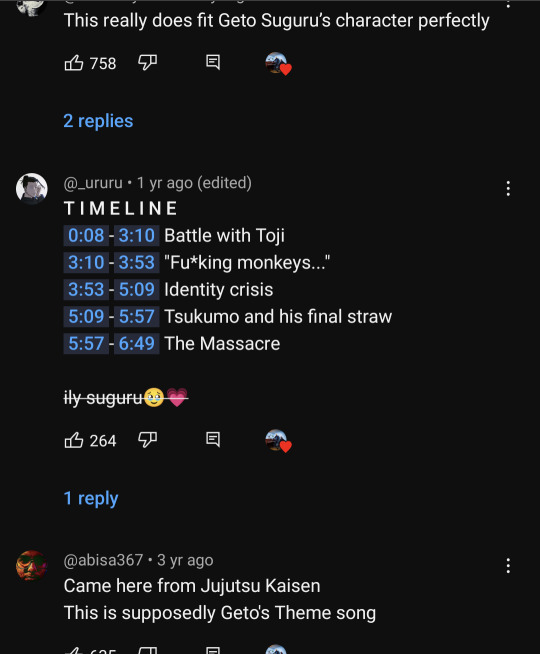
Gojo on the other hand is like reading him come to terms with his loss of Geto and his youth and strive to make the world better for his students. It's emotional and beautiful.

Just urghhhh it makes so much sense Gege is a fan of tragic BLs and used it to inspire this because my GOD.
"In a corner of a room filled with the afternoon sun
Lies a crumpled diary
When it fades to an orange and you become lonely
The last white page
Rip it out and fold into an airplane
Let it fly the great skies as we promise to meet again"
This is exactly it, Gojo mourning the loss of youth, the final act of killing Geto and that part of him and wishing he will see him again one day.

118 notes
·
View notes
Text
i saw an incredible post on tiktok and i wanted to expand on it, because it's genuinely amazing. all the credit to @noesbf on tt for the idea that inspired these thoughts.
geto's character is threaded through with motifs of consumption. he takes things in, whether they be curses or daughters, and is spurred by intense empathy that ends up going in the "wrong" direction once he takes the entire jujutsu world under his wing.
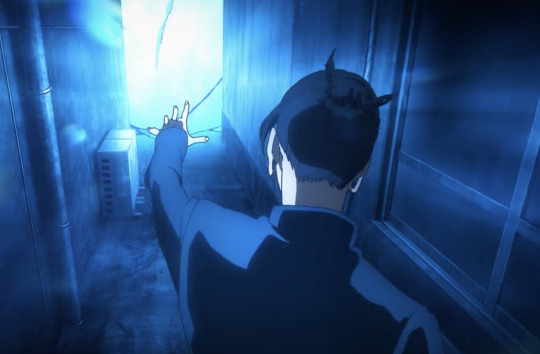
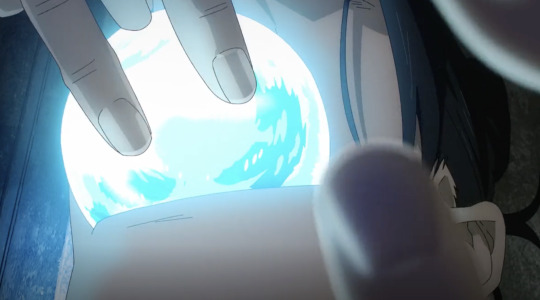
when we're introduced to him in hidden inventory, our first glimpse is of him consuming a curse. he's also alone, in a dark alleyway, a symbolic image that parallels his journey throughout the story. he's a consumptive force, a facet of his being that ultimately leads to his undoing because he consumes the responsibility of "saving" the strong, who are burdened by the weak.


gojo, on the other hand, repels. he's an outward force, extending out a physical barrier that creates distance between his body and the world. where geto invites, gojo rejects. their abilities are constructed as diametrically opposed to one another's.

through the motif of gojo's abilities, this image captures their consume/repel dynamic in a singular shot. after riko's death, gojo leans into red, which repels. he focuses on growing stronger and in doing so, isolates himself from the world (and subsequently, geto). on the other hand, geto leans into blue, which aligns with the consumptive nature of his character. he harbours riko's death inside of himself and it festers, like a curse.

black holes are all-consuming vacuums. they subsume everything around them and create an inescapable vortex— once you're pulled in, you're never getting out. it will literally eat you and in doing so, makes you an everlasting part of it.

white holes, on the other hand, function in opposition to black ones along the same axis. where black holes pull, white holes push. nothing can enter them; they're doomed to a lonely eternity because of the force that holds the universe at a distance. nothing outside of it can affect what goes on within, yet it affects everything around it.
however, white holes can be subsumed by black holes. while nothing can enter them, if a white hole were to cross paths with a black hole, its consumptive force is so powerful that it would eat them too.

after geto and gojo experience a rapture in their relationship, gojo withdraws from the world, holding everyone at a literal and figurative distance. yet, even while he's alone, he's endlessly drawn towards geto. his eyes are bound but his soul isn't— it's tied to the piece of him inside of someone else, and gojo visibly feels the pull.
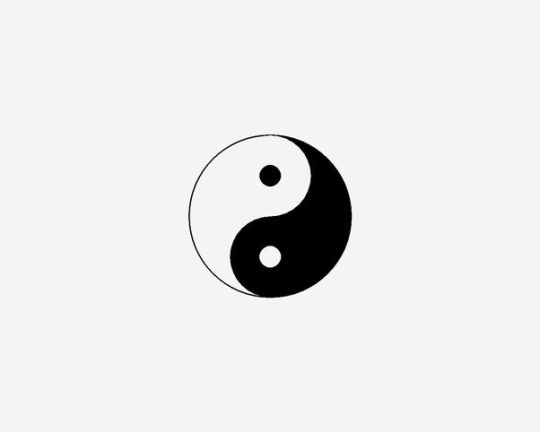
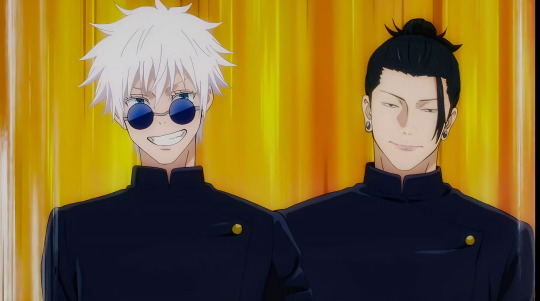
white/black holes also correspond to the colours associated with gojo and geto's characters (they align with their yin/yang dynamic, where yin (black) symbolizes darkness & the moon and yang (white) symbolizes light & the sun).
yin/yang are more than two halves; they form an indivisible whole. they become one another: light turns to dark, the moon replaces the sun in the sky, life transitions into death only to be born as life again.
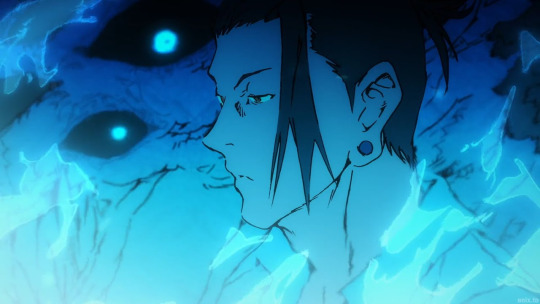
if two celestial bodies exert oppositional forces upon each other, they function in equilibrium. geto's consumption was growing alongside gojo's repelling, reaching an event horizon when he took the lives of 112 villagers and forcing the two of them out of equilibrium. he continued to consume (curses, money, vulnerable people through his cult) until he died and took gojo's soul with him.
consumption can only exist if there's a repellant force pushing back. geto and gojo are not opposites, instead, they each contain the other— every yin has yang within it and vice versa.
they are borne of each other, they are unknowable without the other. they are more than matching; together, they are complete.
#my jjk meta#this is kinda all over the place but hear me out lmfao#jjk meta#jjk#satosugu angst#satosugu analysis#satosugu meta#jjk angst#jjk analysis#gojo and geto#gojo angst#gojo analysis#stsg angst#stsg brainrot#stsg#satosugu#gojo satoru#geto suguru#satoru x suguru#geto#gojo#jujutsu kaisen meta#jujutsu kaisen analysis#jujutsu kaisen angst#jujutsu kaisen#geto angst#geto x gojo#gojo x geto#jjk gojo#jjk geto
1K notes
·
View notes
Text
Geto was loved even in death.

Wouldn’t it be nice if he were judged by his intentions in the afterlife - wherever that was? He had suffered living with the love he had. We see through the eyes of those left behind, that the ill deeds didn’t define him, as strange as that may be to us as readers in the real human world we live in. Geto’s influence and loving nature were far reaching; Gege certainly made him so treasured by many even after his death. If Gojo was touched by his caring influence, this was also Geto’s will he passed onto his students.
NOT spoiler-free as I’ll be referring to the recent chapter, 255.
I wrote this the other day:
And honestly it’s long enough; here’s part 2.
Is it obvious I’m suffering from brainrot? All my drafts from jjk brainrot are rivalling my thesis/dissertation from way back (lol)
Here is more under the cut:
I’m really moved by the reasons for why Miguel and Larue have decided to join in the risky fight against Sukuna.
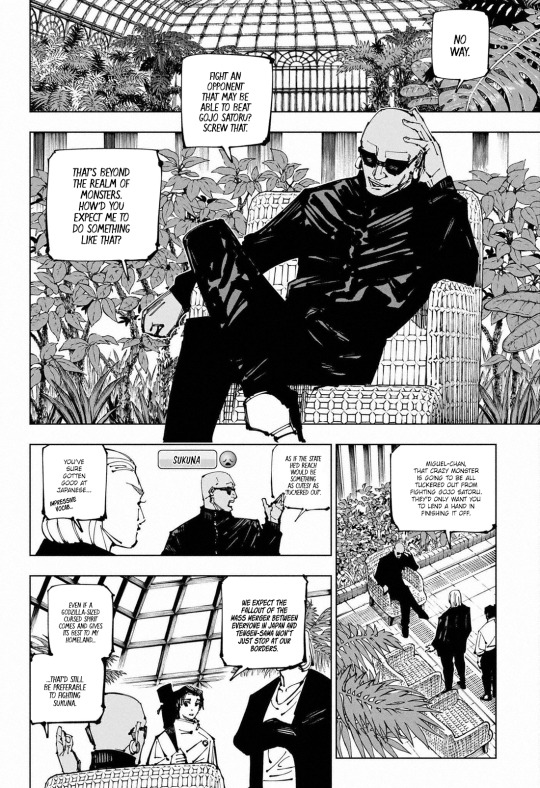
It’s very obvious that Miguel is reluctant at first. He says he he’d rather terrible curses arrive at his shores than to fight with Sukuna, adding that he doesn’t see himself having any ties with Japan any longer.
We can deduce that this was part of Gojo’s plan for the possibility that he dies/loses, and I had a post about this saved in my drafts - but I guess I never got around to finishing it. Basically, in sum, he will achieve giving Geto a cremation (avenging him) and gets to show off to his students (which he does enjoy) by going all out (soo satisfying), and in the worst case scenario, he loses but gets to go all out, weakens Sukuna (for the rest to handle), and idk if he really is that romantic (so it’s really stsg headcanon fantasising) he will die on the same day as Geto.
The Opening theme is rather beautiful in that it interprets Gojo having the words, “we’ll meet again” stuck in his throat, which he doesn’t say. But I’m a bit weird and tend to separate anime from manga. But it’s worth noting that here.
I digress. Back to Miguel and Larue who have moved to speak privately without Yuta.
In a previous post I wondered aloud about what Yuta knew about Geto from others aside from being villainous and I guess this implies he doesn’t know much, since he wasn’t close to Miguel enough to sit around to chat with them. It makes sense.
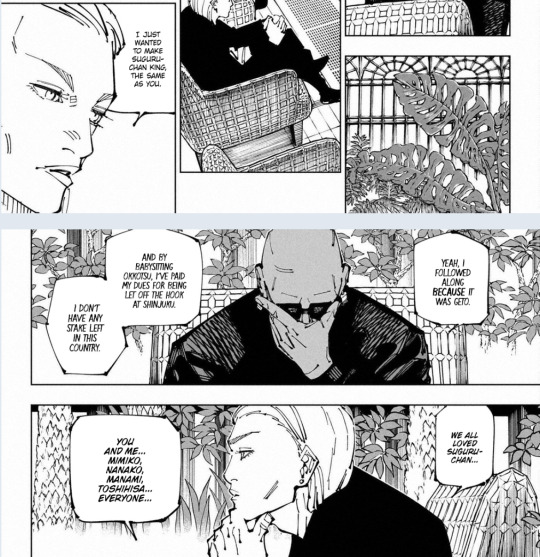
Miguel and Larue both agree they followed Geto in jjk 0 because they wanted to see him become King. What does this even mean, really? Gege, you’re missing stuff out again!
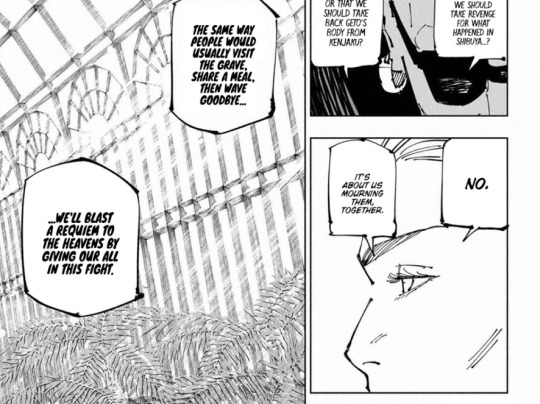
Nevertheless, we understand how reluctant Miguel was. He enquires that Larue intends to do, clarifying: is it for revenge or to take Geto’s body back?
And it seems like their main motivation for putting their lives on the line... is to honour Geto’s memory. Like a traditional ritual one makes for the dead (customary in Japan on death anniversaries - not limited to the year, but also number of days).
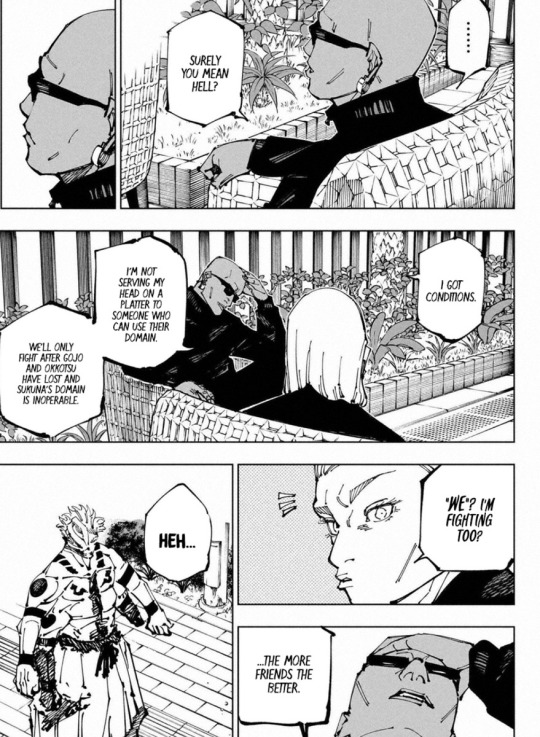
It’s incredibly moving how much they love him. This is actually what led Miguel to reconsider. We see him go silent as he thinks “...” before he reaches a moment of clarity/a decision.
Tbh I have issues with interpreting his statement in between the two panels (re: hell) in Japanese - it doesn’t directly indicate if he is referring to the former part of the conversation (whether he thinks Geto is in hell), or the latter (he thinks the battle will be hell). The phrasing goes like this: “no matter how I think about it: it’s hell.” - I’m not a native speaker so it’s difficult for me to be certain which is right. But the consensus is as translated above. Larue thinks Geto is in heaven, Miguel thinks it’s hell, and we see the airport scene where presumably Haibara and Riko with Kuroi have been there for over a decade. lol. Who knows!
So the bottom line is… regardless of where they think Geto ends up in the afterlife, Miguel is willing to give Geto a send off that’ll even reach hell. Or, despite it going to be hellish, he will do it. It also seems so heartwarming how they still emphasise family and friendship in wanting to fight together - perhaps things we can surmise had meant something to Geto.
They will fight Sukuna because it is for Geto. Geto was so loved that they would risk themselves - not for a title, not for revenge, but out of … love. Again. That’s pretty damn loving. Can we imagine what Geto did and was to them, for them to experience such loyalty and reverence?
Sadly, it goes without saying that Geto’s body being used as a vessel and puppet by Kenjaku has possibly evoked an emotional response by those who cared for him - namely Mimiko and Nanako, and also Gojo. Arguably, even if it were a death without his body being hijacked, Gojo did refuse to cremate his body or have it processed “by the book” of jjk high through Shoko. If that’s not out of a form of love (or “consideration” as Kenjaku put it), I don’t know what is.
The twins went against what Geto wanted for them (to carry out his will) to fight against immensely power beings in hopes they could bring him home. Those were their reasons to fight. Gojo scheduled 24th December - this was after he teleported to Kenjaku immediately upon unsealing so he could bury Geto. We saw Larue and Miguel’s. Toshihisa is alleged to be quite weak, and despite potentially being considered a son to Geto (if his life situation did mimic that of the twins’ - source: jjk character book), he opts to follow the inherited will as prescribed by Geto.
It’s all love. Geto was loved, I’m telling you. I want to shout if off the rooftops because that man just looked so darned sad and deranged after he lost it.
So. Continuing where I left off: Everyone thus far has had a reason to go into battle with Sukuna. I wonder what / who will actually reach him? I hope it’s Yuji ... and that Megumi will react again at some point. They have their own themes relating to love and purpose. I’ll leave them to someone else more familiar with their characters to write about!
And now I’m going offside quite a bit, but it’s still of relevance to Geto and the theme of love that seems to surround him. Way back to jjk 0 and Hidden inventory.
I wanted to just bring this into the picture as well now that I’m already writing a post on that topic, but please feel free to stop if you’re bored now.
So. Jjk 0!
There were direct parallels with Yuta & Rika and Gojo & Geto. This was also confirmed by the director when discussing their vision for the movie. The light novel also drew a link between Geto and Yuta where they were described as being too sincere for this world.
There is a direct theme of love - the type, is open to interpretation.
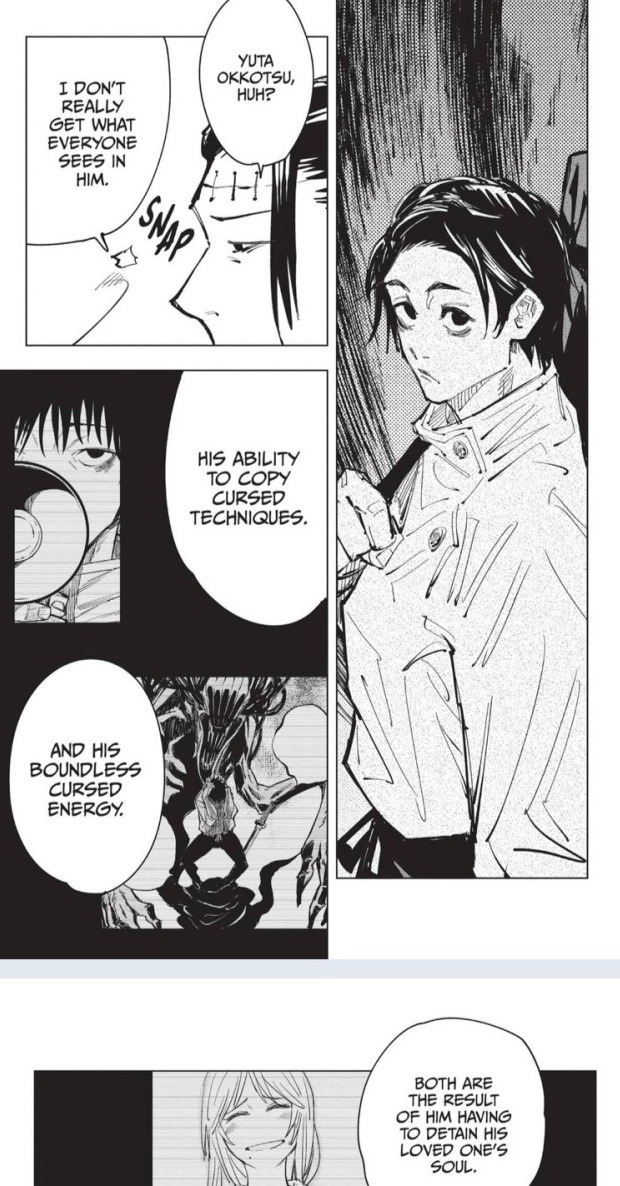
Kenjaku also makes reference to this in the Shibuya arc. So to me, it remains relevant. Love in its many forms is somewhere in what Gege wishes to convey thematically.
Within jjk 0, Geto seemed to pursue power but this was also a symbolism where power = love. It is twisted. In light of recent events, we know that the pursuit of power leads to the dilution and even absence of love. Love that gives birth to power becomes cursed. So it seems.
As we know, Yuta bound his lover to himself to gain power.
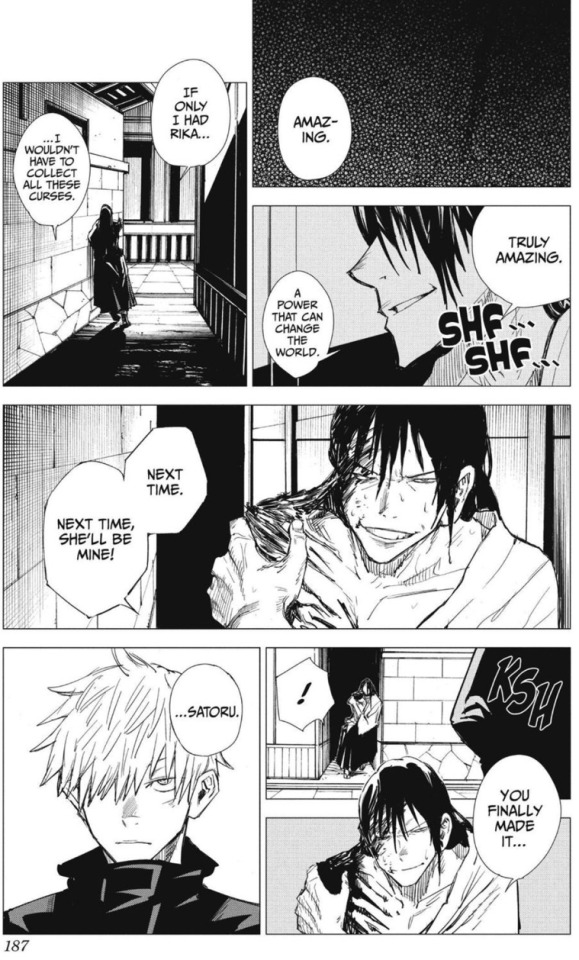
If only he had Rika (metaphor for love: Gojo) he probably wouldn’t have had to skulk around the shadows consuming curses which he hated doing. Geto was lamenting on the past in the above panels. He probably was determined to carry on, as he vouched to give it all he got (Haibara’s last words to him echoing here).
A flashback to the past:

Geto doesn’t do things in half-measures. To avoid hypocrisy, and I headcanon that it was a merciful killing to protect them from him, he kills his parents. To die by his hands than to be used as a pawn to get to him. For them to see the horrors their son could be capable of. It is so very wrong, and we can see the twisted nature of his love in this interpretation.
And Gojo delivers the ultimate blow that leads to Geto reflecting - depicted by the mysterious ellipses “…..” (gege really likes the reader to work hard huh) - insinuating it is impossible for Geto, so don’t even bother trying. The blossoming possibility of discourse was nipped, as the strength differential was implied - you’re the strongest now, whereas it used to be “we”. There was no more place for Geto; it was probably a misunderstanding. Gojo was protecting everyone in his own way, and the only way he knew how.

For power, Gojo was a source - but Geto couldn’t do that in Shinjuku, nor earlier in the arc, when Gojo himself was on the brink of insanity and deferred to Geto about annihilating humans as he held Riko’s dead body. Geto in the scene above acknowledges their different paths they needed to take - Gojo had a place as part of the elite at the school - Geto was already facing an execution order.
And after hearing Gojo’s condescending tone in an emotionally-fuelled attempt to reach out to him. He turns away to protect his friend from himself, and himself from his friend. Anyway, I touched on this in my previous post. Geto feels they had fought and didn’t deserve a place next to Gojo. But deep inside, even his body remembers the sound of Gojo’s voice, reacting to it when called despite his soul no longer being there.
sigh. Moving on... back to jjk 0:
After witnessing the bonds through willingness to sacrifice and the love between these students, Geto was really moved. Gojo trusted Geto retained his sense of humanity / love / idealism - even if it would lead to him sacrificing himself.

He was finding it difficult anyway:
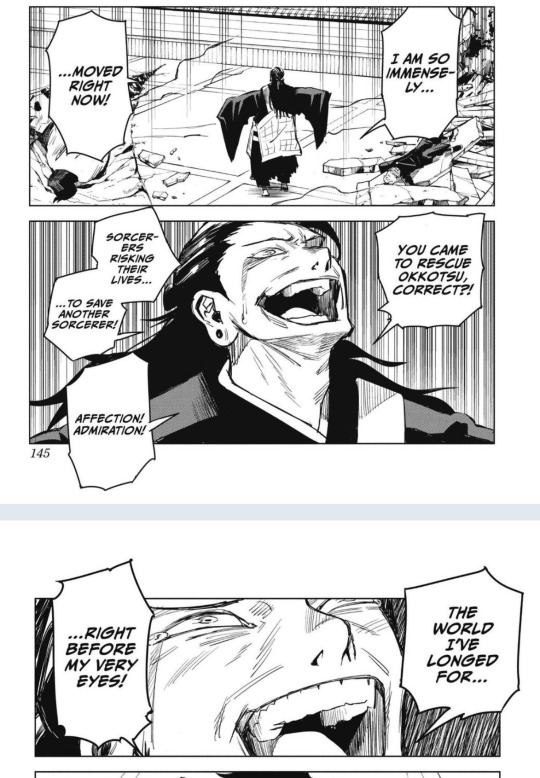

He could always empathise with love. I suspect he tried his best, but the binding vow for Yuta’s life was also just the cherry on top to make Rika super saiyan.
Kenjaku knew Geto probably could’ve won though, had he been more selfish.
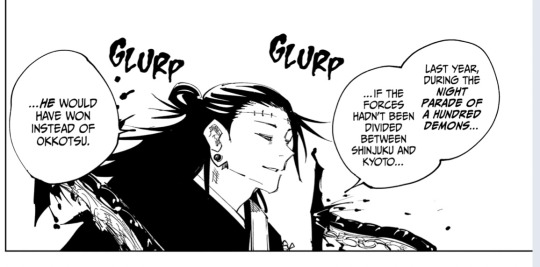
Geto conceded without a fight with Gojo. Maybe it was a matter of trust in that they both knew his living on borrowed time. As the light novel insinuated, this was the only way it could ever end. And Gojo would have to carry the curse that was Geto. This seems... so cruel.
He did his best. He perhaps always wanted the love but set it free.
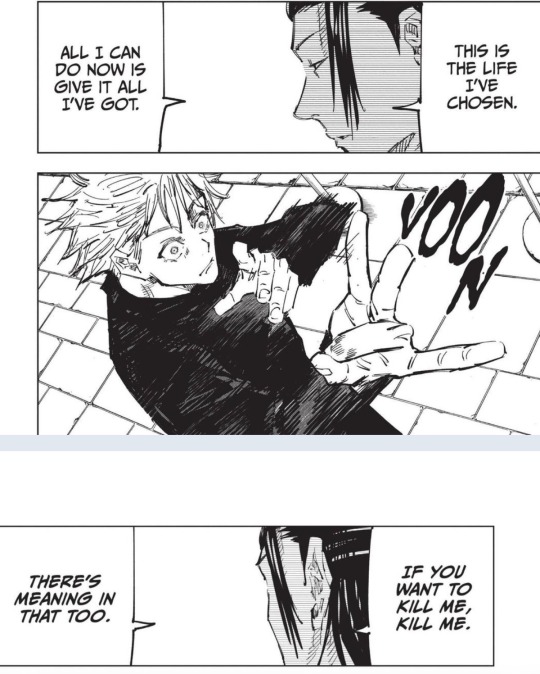
He did so many things for others in spite of himself, in sacrificing himself, in staining himself with blood drenched hands.

Avenging Riko by killing Sonoda. Note how manipulative “humans” are by using Jujutsu rules against them.

He embraces a life of smoke and daggers. Living in lies and half truths in order to live, survive, and find justice in a wicked world.
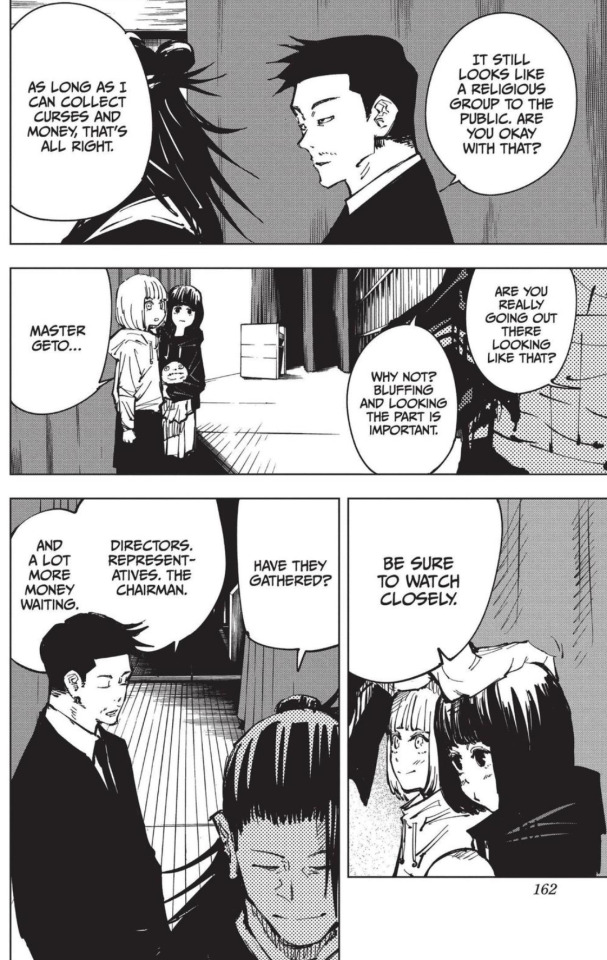
Watch me closely, I’ll protect you, I’ll avenge you, this is how you protect yourself.
This is the path I’ve chosen.
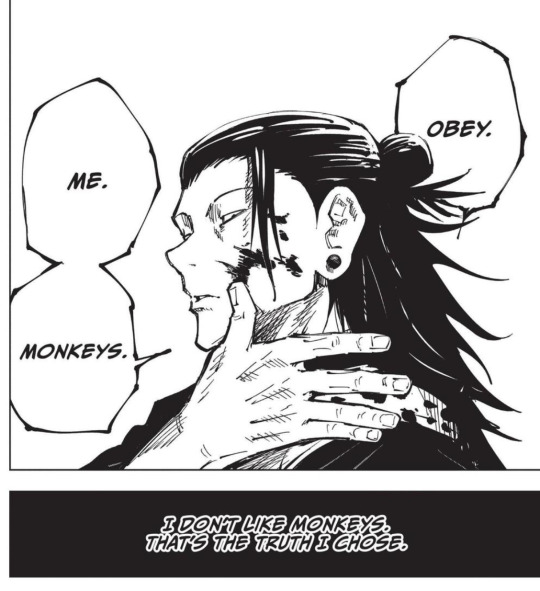
I’m not saying he was right or justifiable. His character is just tragic. The system had set him and others to fail.
The worm foreshadows Geto’s maternal nature. Calling him “okaasan”. I mean, this very worm had a binding vow with Toji. And now it calls for a new owner? I’m not sure if Gege had anything else in mind with this... is the womb protrusion domain Geto’s? But that’s tied to a sorcerer’s soul…. Anyway, I digress again. (Sorry). Geto did have a martyr complex and was written captivatingly well by Gege. The extra touches where how he has been perceived by others and the effect he has (and continues to have) on those we see.
And I just want to leave this heartbreaking thing here:
Source from twitter/now X:
Wouldn’t it be so sweet for Geto to get one (love declaration) at the end of his life, regardless of the way you perceive Gojo and Geto’s relationship?
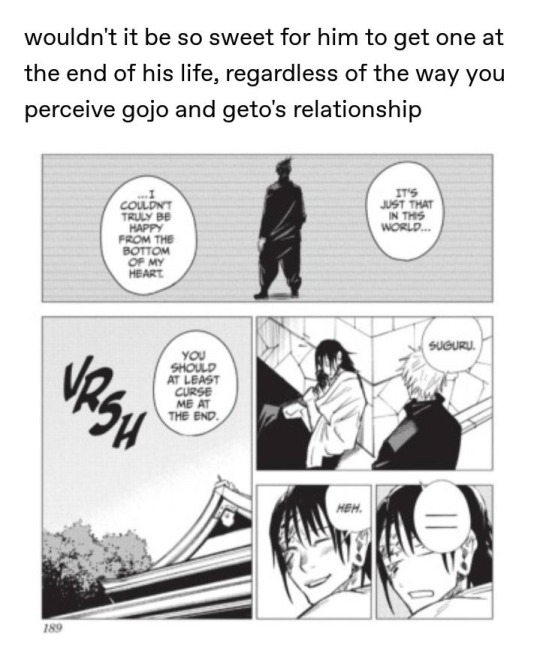
Wouldn’t it be nice for him if he could know that his family who he instructed to flee had all loved him, adored him, and would honour his sacrifice in differing ways...
Instead, a form of love meant his body was desecrated and used by Kenjaku. His girls were killed, and his full potential was not quite realised at all.
If only things were different.
Gojo should have kept him in his basement!
But at least, I think, Gege is giving Geto some love even after his death.
For that I’m thankful.
And thanks for reading if you made it this far with my rambling!
If you want something more light hearted I have a fluffy fic up on AO3 (it isn’t great but i enjoyed writing it to fantasise about what happens at the airport) and if you want more angst and pain, please browse my tags (lol).
#jjk chapter 255#just my interpretation#satosugu#stsg#jjk analysis#jjk spoilers#jujutsu kaisen#gojo satoru#jjk meta#geto suguru#jjk#jujutsu kaisen analysis#jujutsu Kaisen meta#suguru geto#Geto meta#Geto analysis#Geto Suguru analysis#jjk 0#jjk character analysis#jujutsu kaisen character analysis#Geto theories#jjk theories
92 notes
·
View notes
Text
Shibuya arc thoughts: I had an interesting thought while re-reading a certain scene
Spoilers if u aren’t caught up in the manga:
Okay, this:

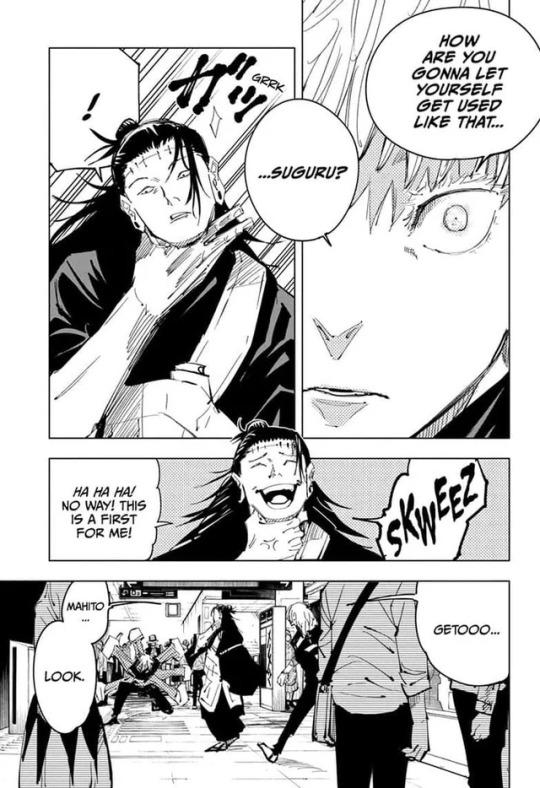
I always thought that conversation between Kenjaku and Mahito was interesting. The whole concept of their difference in beliefs based off of the proof they both experienced.
Mahito believes that the soul comes before the body because he can transform souls and have them do his bidding as long as he touches a body. It’s instant contact into the soul, and as soon as he alters the shape of the soul, the body changes because the soul takes precedence over the body.
Kenjaku on the other hand believes that the body is the soul and the soul is the body because in his thousand years, not one host body has ever fought him back the way Suguru did to try and save Satoru. He disagrees with Mahito, explaining that the host body’s memories wouldn’t be retained otherwise.
Let’s dissect this a bit.
If a host body was a blank slate and didn’t retain memories, Kenjaku would’ve agreed to Mahito’s conjecture. So, if Suguru had no reaction to Satoru, it would basically prove that once a soul leaves a body, it’s nothing but an empty shell.
But it doesn’t. Suguru does react to Satoru, somehow. Against quite literally all logic. It then challenges Mahito’s beliefs, because a piece of Suguru’s soul is still in the body. It’s not an empty shell. Suguru’s soul didn’t completely leave his body.
But Mahito, who has been through very different experiences, disagrees. He says that their techniques are what makes their perceptions on the matter different.
Kenjaku’s technique involves using his brain (carrier of a soul/consciousness) to take control of a host body. The swapping of souls inside a shell.
Mahito’s technique involves touching a body to take control of a soul. Only then when he changes the shape of a soul does the body change shape too. So to him, souls first, bodies second.
He tells Kenjaku their techniques separate them into two different worlds. Kenjaku replies with “so techniques dictate our worlds, I like that, it’s poetic.”
But the interesting thing is, I don’t actually think they’re disagreeing at all. In fact, I think they’re saying the same thing, just understanding it differently.
Mahito can only change the shape of a body if he touches the soul. That right there shows you that the soul and body are interconnected, like Kenjaku said. You’d think that if souls were completely separate from a body, Mahito’s technique wouldn’t involve the need to physically touch a body. (Even in his domain, where his own soul is all around the opponent, touching their body.)
Maybe the soul does inform the body, but it can never be without it. The body is the soul.
In a way, Satoru was able to replicate Mahito’s domain expansion without needing his cursed technique.
Because his soul could see through the bullshit. And it called out to Suguru. It touched Suguru. It moved him. Their souls somehow made contact.
And something else that I wanted to bring up while reading it.
“Technique dictate our worlds. It’s poetic.”
When I first read it, I was sort of like “…we were just talking about souls and bodies where did this come from?”
And then I thought about it.
How did their techniques affect Satoru and Suguru’s worlds?
At first it brought them together. They were both the strongest. Then it tore them apart.
Suguru’s technique involved him needing to absorb curses. He had to physically ingest them. He had no choice but to take in all of the grime of the world.
Satoru’s technique is the exact opposite. He has Infinity. Nothing can touch him. He’s impermeable. A flick of his finger and the curse is gone, no contact needed.
Is that what Kenjaku meant when he said it was poetic? Because his and Mahito’s techniques are really not all that different. They both use other people’s bodies to do their bidding and bend to their wills as they please. And for that, they work together. But Suguru and Satoru’s techniques were complete opposites and it eventually came between them. Suguru needing to give pieces of himself every time he used it and Satoru remaining untouchable.
It’s almost as if Kenjaku is saying, tauntingly, “maybe if you weren’t so different this situation would never have happened.”
Suguru’s feeble attempt to stop him is for naught. An arm trying to strangle him to no avail can’t do anything to save Satoru. He tried out of love.
But sometimes love really isn’t enough.
#WHEEEEW#losing my mind all over again#satosugu#stsg#jjk meta#jujutsu kaisen meta#shibuya spoilers#jjk#jujutsu kaisen#gojo satoru#geto suguru#suguru geto#satoru gojo#jujukai#jjk spoilers#satosugu meta#satosugu analysis#satosugu headcanons
339 notes
·
View notes
Text
Why am I just now realizing that Gojo - with his Six Eyes, that allow him to see other sorcerers' techniques - must've seen that Megumi had Ten Shadows when he first met him?
And the reason he made "that face" was more than just that Megumi looked like Toji.
Gojo found this little kid who was the son of the man he murdered, and who had the only technique that was an actual threat to him - the technique he knew, historically, could be used to kill a Six Eyes/Limitless user...and Gojo probably should've just killed Megumi right then, before he could grow up and get strong and (maybe) want to avenge his father.
But instead he trained the kid and protected him and encouraged him to push himself to be even stronger (greedier) and even told him he could be strong enough to kill him one day.

#Gojo is not a saint or a selfless man and he has complicated reasons for everything he does but he's not a monster either#his character is SO FASCINATING to me#gojo satoru#fushiguro megumi#jjk#jjk meta#my jjk thoughts
181 notes
·
View notes
Text
➠ Sukuna, the ‘shunned’ child and the demonisation and worship of ‘unwanted’ children in Japanese folklore:
[long read. trigger warning: referenced folktales and practices depict themes of infanticide, religious rituals and child exorcism, demonisation and worship of children, ableism, suicide, implied sa, and period-typical outdated social views. they are not a representation of my personal beliefs. please read with caution.]
New revelations of Sukuna’s past in Chapter 257 made me look deeper into some of the tales and customs from Japanese folklore about children deemed ‘abominable’ in the eyes of society that I had previously noted down and I decided to share as I think they could offer a better insight into Sukuna as a character and what might have inspired Akutami Gege’s depiction of him.
It would be better to start with a bit of the social background of Japanese folklore. I will use the Emishi (an ancient ethnic group of people who lived in parts of Honshū, especially in the Tōhoku region) as an example, the oral tales of whom later blended with Shintō and Buddhist religious concepts and heavily influenced Japanese folklore. It is believed that many of their tales were shaped by the region’s difficult history of natural disasters, famines, and geographic isolation. In the Tōhoku region, infanticide was sometimes used as a form of ‘birth control’ due to repeated famines. The bodies of ‘unwanted children’ were often disposed of in rivers or lakes.
Another important source of such folklore is the city of Tōno in Iwate prefecture, known particularly for Kappa, tales of which could offer a good basis for the beginning of my intended analysis.
Kappa, a green, amphibious, child-like creature with a yellow beak for a mouth and a turtle shell on its back is one of the most popular Yōkai from Japanese folklore. Some researchers say that the darker aspects of Kappa tales in Tōhoku may be an echo of the region’s tragic history of famines and the high rates of infant mortality caused by a harsh climate, natural disasters, and the tax system that was paid in rice. Similarly, many people in Tōno (which is part of the Tōhoku region) believe that tragic history is one of the origins of the stories of Kappa. The Kappa of Tōno specifically are said to be red in colour rather than green, which may allude to the Japanese word for infant - akachan, which derives from aka, the word for red. From this perspective, Kappa are creatures born out of social challenges and disasters. They may not seem all too relevant to Sukuna, but the need to mention them will come up in the later part.
Moving on, at the beginning I mentioned that ‘unwanted children’ were often disposed of in the rivers and lakes, which is also found in the Japanese creation myth. I discussed the variations of the myth in this post about Sukuna previously (you do not need to read it for the moment, but please note that it has many variations), but somehow I did not mention their first ‘inadequate’ child. According to the myth, before they had Kagutsuchi, Izanagi and Izanami had a child as a result of their first attempt at a union, but the child, known as Hiruko (‘Leech Child’), was born deformed. The mistake was attributed to a ritual error on the part of Izanami, who, as a woman, should never have spoken first (i.e. initiated the union). Considering the child inadequate for a diety, they set him adrift in a boat in hopes he would die at the sea. This myth reflects how women and children who were born ‘different’ or seen unable to serve their ‘purpose’ were treated.
Continuing from the myth, Chapter 257 made me think of the tale of Katako, in which the protagonist is born half-human and half-oni. What is Sukuna’s true nature we cannot know for certain. We know he was a human once, but we do not know enough of his past to assume if there was more to him (how and why he as a human might have come to be called the King of Curses will be explained in the later part), but the tale still has the potential to give us insight into Sukuna and his mother’s relationship. The tale has various versions with different endings, but it generally could be summarised as follows:
[A long time ago, a man encountered a man-eating ogre (from here on referred to as oni) while working in the field. He told the oni how much he loved mochi (rice cake), jokingly adding that he could even trade his wife for it. Taking his casual banter seriously, the oni treated him to mochi. The man ate his favourite food to his fill and happily went home only to find that the oni had taken his wife in exchange for the treat. The man searched everywhere and finally found his wife on the island where the oni lived. The man and his wife managed to come back home with Katako (meaning ‘Half-Child’), a child born of his wife and the oni on the island. However, Katako was always ostracised by his human peers (in another version, it is said that he had an insatiable appetite for eating humans). At ten years old, tired of being ridiculed, he asked his mother ‘to cut the oni part of him into pieces’ when he died, and then committed suicide.]
In the tale, Katako’s relationship with his mother seems to be of trust. He is cast out of society by humans and despite his mother being one as well, he does not harbour hate for her, he trusts her enough to leave his final wish upon her. We do not know much about Sukuna’s relationship with his mother, but the manner he referred to her in the last chapter makes it seem that he also harbours no hostility toward her. This tale also shows how children deemed ‘different’ were treated.
In past ages, children, being considered closer to the gods and the Other World, also played the part of intermediary between humans and the gods in Japanese society. This task of mediation between two separate worlds fell to them because they were regarded as incomplete persons (until the age of seven it was considered uncertain whether they would live or return to the Other World: a belief related to the challenges indicated at the beginning). While considered sacred beings different in nature from adults, they were at the same time looked down upon and referred to as kodomo (where ~domo has a negative/belittling connotation), gaki (hungry ghost or demon; brat), or jari (lit. gravel).
Back in the day, people referred to the killing off of ‘unwanted children’ (mabiki or ‘culling’, a common old slang for infanticide) as ‘sending a child back’, and a dead child was given a special non-Buddhist funeral. The various rituals surrounding birth and the child’s upbringing were intended, through communication with the Other World, to transform the child into an earthly being. This aspect of the ritual made me think of Sukuna’s mask and how that part of his face resembles a burn scar (note: i am aware the nature of his ‘mask’ is still not clear and whether it is really one) in some of the official illustrations. It is known that rituals of purification included fire and water magic. Exorcism of demons, aversion of disasters, and other rituals for the removal of pollution were frequent. A katashiro (paper cut in the shape of a man) symbolising the disaster would be burned or floated down the river as well. Personally, I see the possibility of Sukuna’s scar (if it really happens to be one) being from one of such rituals.
Continuing, there is a term - Goryō used to refer to the spirits of those who had died violently (e.g. by murder or execution) and have become gods. It also included those who had died untimely deaths and therefore had been unable to fulfil their purpose in this world. Some notable gods such as Hachiman, Tenjin, and Tenno were once considered powerful Goryō. Great natural disasters and social unrest were attributed to them; rituals designed to appease them were performed, and a cult of such worship evolved. It was (usually) as a result of belief in Goryō that particular individuals came to be worshipped as gods. At times when public unrest threatened the social order, elements estranged or excluded from the ‘normal system/order’ were assigned the status of Goryō and worshipped as such. The cult was intended to purify and renew society. Manga has given us a similar glimpse of Sukuna’s past, where despite being feared (and despised), people were ready to serve him (and pray in his name) for their own well-being. I think Akutami intended to echo this very aspect of society through the scene.
I mentioned that children were considered closer to the gods and the Other World, but not all children were treated equally. One version of the origin of Kamadogami in the Tōhoku region is that he was an ‘ugly child’ from the Dragon Palace who had been killed and was thereafter worshipped at household hearths. Zashikiwarashi, who often inhabits old houses and is said to bring good fortune while he remains, is another household god in the shape of a child or, in another version, the spirit of an unwanted child who, having been killed off, became the guardian god of houses. I mentioned Hiruko at the beginning as well, who was set afloat on the boat in the sea. Despite that, he is in some Shintō shrines identified with Ebisu, the patron of fishermen and tradesmen. Their worship was for the purposes indicated in the previous abstract, to avoid their wrath. Sukuna has not been ‘killed off’ like these children were, but such worship shows us the general psyche of the public.
I indicated that socially inferior and rebellious beings were treated similarly in the previous part. The character Dō of Dōji (童子, meaning child) once meant ‘slave’, tattooed on the forehead, and was closely linked to notions of personal status. It signified one who was not a complete person and also one who had not yet been initiated, in other words, one who did not belong to the order of this world, one who was in this world but not of it. They were despised, feared, and avoided by ordinary people for their strange appearance and magical powers. In some cases they even formed separate ‘child’ villages (dōji mura), calling themselves ‘descendants of oni (demons)’. Since they played the role of demons during the rituals, they were shunned by the nobility as if they were real demons. Could this somehow connect to Sukuna’s title? I do believe there is a possibility this could have inspired his being as the King of Curses.
The ‘ugly child’ who appears in the story of the origin of Kamadogami has parallels in Yokenai, Untoku, Hyotoku, and Hanatarekozo, children who brought good fortune and prosperity to the house in return for offerings to the Watery World of kadomatsu (pine-branch gate decorations for the New Year) and firewood. But despite that, their ‘ugliness’ and names were used as an indication that these children did not belong to this world. It is important to note that socially inferior and rebellious beings were treated in the same manner (here is where the point connects to Sukuna, continued from the next part in depth). Such children were often associated with the colour red. For example, Zashikiwarashi is described as red-haired and red-faced. Kintaro, Shutendoji, and other children born in unusual circumstances (but may not have been considered an ‘ugly child’) and brought up in the mountain wilderness are also said to have had red bodies and were endowed with superhuman strength. I also mentioned that Kappa from Tōno were depicted as red. We see Sukuna often associated with the colour red, particularly, his eyes are red. I believe the above-mentioned could be the reason for that.
Personally, what we know of Sukuna and his past seems to echo these folktales and practices as the foundation of his character. He was a ‘Demon’ for being an ‘abominable’ child, but he was worshipped for this same reason as well. Whether he was born that way after eating his twin in the womb or something happened to him later in life cannot be known yet, but it is clear his ‘abominable’ appearance could have warranted the same treatment from society. It could also explain Kenjaku’s ‘fascination’ with him as a being. We do not know what relationship they had or how exactly they came to know each other, but there is clearly a reason why a being such as Sukuna would ‘work’ with them. We do not know much about Kenjaku either, but it could be possible that they (Kenjaku) once were either (1) one of those ‘priests’ who performed exorcism to purify ‘demon’ children or (2) someone who offered such children refuge (perhaps and more likely, for their own personal gain). It would also relate to the variations of Ryomen Sukuna’s story that inspired Akutami Gege.
[Disclaimer: This post does not intend to demonise Shintoism or Buddhism, but to tell folklore and practices for analytical purposes. Additionally, English is not my native language and this is only a personal interpretation as just another reader that I am sharing in case someone finds it interesting or can use the information for better analysis.]
#oh. ha. guess who zoned out and ended up with this huge info dump.#if anyone actually reads this i will be shocked.#this is probably the last one on sukuna. (watch me change my mind when something new is revealed next chapterㅋㅎ)#jjk#sukuna#jujutsu kaisen#ryomen sukuna#jjk spoilers#jjk analysis#jjk meta#ryoumen sukuna#jjk sukuna#sukuna ryomen#(which one is the actually used tagㅋㅎ)
54 notes
·
View notes